#the problem I think is that the story does not always align with the metaphor
Text
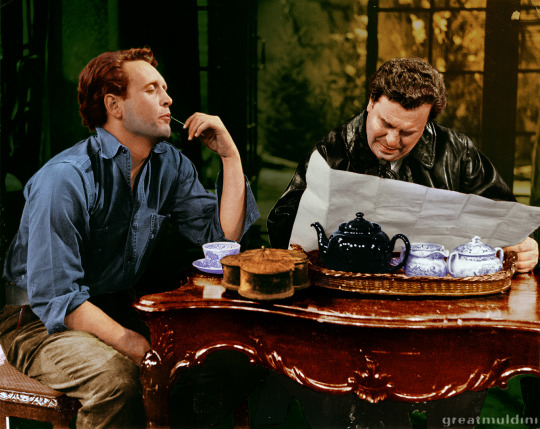
The Iron Harp
We’re all in prison together, Johnny, one way or the other.
Act 1
Outwardly, Joseph O'Conor's play is a simple tale of love and loss in times of war: set in rural Ireland in early April of 1920, the action takes place on the property of an English industrialist whose mansion has been taken over by a contingent of IRA volunteers. Their leader is Michael O'Riordan, a gifted poet-musician in civilian life and conveniently the peace-time manager of the Englishman's estate. Michael has recently been wounded in action; now blind as a result he is no longer on active duty but still responsible for an English prisoner of war. Being a man of his word, Captain John Tregarthen has made no attempt to escape, earning Michael's trust and eventually his friendship. He also earns the friendship and love of Michael’s cousin Molly Kinsella, with whom he spends long days roaming the extensive grounds of his idyllic prison. Dreaming of a future life together, the lovers are oblivious to the feelings of their “best friend” – who ends up sacrificing his love for Molly in what he hopes will be a lasting gesture of selflessness only to find that Fate intervenes, with devastating consequences for them all.
Completing the quartet of characters is the dark and “indistinct” figure of IRA commander Sean Kelly, a dark and "indistinct" figure who emerges from the shadows to immediately assert his authority not only in military matters but - crucially, and disturbingly - in those of the heart as well. Specifically, it is the heart of Michael O’Riordan that Kelly claims to know better than O’Riordan himself. As a flesh-and-blood character Kelly is difficult to pin down: cold and calculating by his own admission, he expresses admiration for Michael's hot-blooded fighting spirit. Michael's own startled response to Kelly entering "like Nemesis himself" is ambiguous at best, and even his description of Kelly as a “good friend” comes on the back of a warning to Johnny that "he won't like you."
When Kelly tells Michael that he has never been wrong and does not know what it means to feel regret, the sense of foreboding is inescapable, yet Michael never seems to give in to the negativity emanating from his old wartime comrade who admonishes him to see his friends “as they really are” and not as “you want to see them.” Ironically, Michael refuses to see an enemy in John Tregarthen, but he is equally stubborn in applying the same criteria of honour, loyalty, and friendship to Sean Kelly, who seems troubled by this flaw in Michael’s character: "you love people too much."
Michael's emotional warmth stands in stark contrast to Kelly's impersonation of infallibility - which Michael seems to accept as a token of his friend's unassailable integrity. He continues to defer to Kelly's judgment when a messenger arrives with bad news from the front: three IRA fighters have been killed in skirmishes with British forces, and reprisals must be carried out. Twisting the metaphorical knife in the very real emotional wound, Kelly as the commanding officer nominates blind Michael to be the impartial instrument of God's justice. Forced to select three victims for execution, Michael all but collapses when one of the chosen names is that of Captain John Tregarthen.
Act 2
After he has persuaded Johnny to flee the country and reunite with Molly back in England, Michael is left alone to guard the now empty house. Blind and unable to defend himself, Michael is powerless against two marauding Black & Tans who break into the property and proceed to taunt and abuse the solitary occupant. It does not take them long to realize their victim is an IRA member rather than a civilian enjoying certain protections. Further violence is prevented only by the surprise return of Captain Tregarthen, armed and in uniform, who holds the attacker at gunpoint until Kelly and his entourage arrive to take the men away. Where any other human being would have expressed relief or gratitude at the discovery that the life of his friend has been saved, Kelly’s reaction is characteristically impassive, betraying, if anything, a degree of irritation at the unforeseen complication that has shown the condemned prisoner – the enemy – to be capable of compassion and self-sacrifice in saving the life of his friend. Human qualities that Kelly explicitly claims not to possess. As if to prove the point, he responds with the formal announcement of Tregarthen’s impending execution.
The order is to be carried out within three days, enough time for Kelly to travel to headquarters - and return with a firing squad. But first he must interrogate the captured Tans. While Kelly is thus occupied, Molly manages to convince the love of her life to take her with him. Johnny only agrees to the plan on the promise that Michael will convince Kelly to rescind the execution. If Johnny and Molly can make their way to Belfast on the early morning goods train, and from there to England, all will be well. Michael knows how to distract the guards, and Molly can bribe the train driver to let Johnny jump aboard. Three loud whistles will give the all-clear. With hopes of future happiness rekindled, Molly and Johnny each rush off to their respective tasks, and Michael is left alone with three empty glasses that he cannot see – a detail that does not escape Kelly’s notice as he re-joins Michael to formally accept his plea for clemency. Which he says he will duly submit to "the general," but in his estimation the chances of success are slim. "For God's sake, don't build up hope," he tells Michael before agonizing – to himself – over how to soften the blow for Michael: by bringing the execution forward and keeping it secret, he is certain he can spare Michael the pain and the guilt of having to witness the event.
Act 3
In the pre-dawn hours of the following day, Michael and Johnny are wide awake and waiting for the sentries to change and the train to whistle. Thinking the house empty and their enemies far away, they pass the time in a dreamlike state of high anxiety, reciting heroic poems and melancholy songs in whispering voices, so as not to miss the stroke of six to mark the end of their nightmare and the beginning of a new life – only to see Kelly standing in the door, with orders for Johnny to be executed at dawn, 24 hours earlier than they were told originally. Michael's world is falling apart, he pleads with Kelly, he begs him to show mercy, but an almost equally distressed Kelly reminds him that "I have never promised you hope." Johnny declines the comfort of a priest or minister and is led away to meet his fate offstage while, also offstage, Molly will be waiting in vain for the love of her life to board a train that will never arrive.
Left on stage for their final confrontation are Michael and his Nemesis, both knowing full well that nothing they can do or say will change what Kelly might term the preordained outcome of their efforts. To Michael's accusation of "trickery" (by which he means Kelly's surprise return before the agreed time), Kelly offers no subterfuge, no defence, and no evasion. Instead, he says, Michael’s agony is self-inflicted: it was, in fact, his own stubborn insistence on hoping against hope that has now led to anguish and pain. The only way for Michael to end all suffering, Kelly explains, is to give up hope. Unless he manages to see past the private pain of the moment and becomes a distant observer, Michael will forever be "tortured by hope."
Here Kelly is borrowing from the Conte Cruel tradition made famous by Edgar Allan Poe but named after a collection of short stories by the French symbolist writer Auguste Villiers de l'Isle-Adam. A useful definition of the genre is that it concerns "any story whose conclusion exploits the cruel aspects of the irony of fate." Not only does Kelly borrow the concept, and the title from Villiers' tale, The Torture of Hope, he even recounts the plot to underline his point:a hapless victim of the Inquisition escapes his prison cell only to stumble into the arms of the Chief Inquisitor. The lesson for Michael is that, like the victim, he keeps on hoping for release only to suffer defeat over and over again. There are no similarities, however, between himself and the sadistic Inquisitor, Kelly says: his mission is to ease Michael'ssuffering, not to prolong it.
We are given no reason to doubt Kelly’s sincerity, but neither can we reconcile the apparent contradiction between his declared intention and putting Michael’s best friend before a firing squad. If Kelly wants to end all suffering, as he says, surely, a good start would be to save Captain Tregarthen’s life? It is the argument that Michael himself is trying to make, by reminding Kelly of his god-like powers. Michael’s understanding of those powers differs fundamentally from Kelly’s own. Michael’s life-affirming principle of hope and Kelly’s seductive all-consuming fatalism are the two opposing philosophies that take centre stage in the final scene – while John Tregarthen dies a largely symbolic death offstage.
Johnny’s death is symbolic in that it is not the tragedy at the heart of the play. Michael O’Riordon is the conventional male protagonist whose existential crisis we are witnessing; Michael is unable to prevent the execution of his best friend; and to make that very point, his best friend must die. Michael’s blindness contributes to this failure in the course of the play but read as a metaphor it turns Michael into “one of us.” His blindness leaves him vulnerable to attack and it echoes our own sense of powerlessness in the face of an overwhelmingly hostile universe. The reverse, however, is also true: being blind, and being a poet, puts Michael in the illustrious company of the Blind Bard, an archetype of Western literature since at least the (mythical) time of Homer: the blind singer/seer whose “inner vision” surpasses that of sighted humanity. His Irish equivalent – and explicit model for Michael - is the (dwarf) Harper of Finn, whose iron-stringed instrument has the power to move its audience to tears. Michael O’Riordon is both vulnerable and endowed with the superpower of emotional insight – fundamentally human qualities that Kelly admires in Michael, and which he admits he does not possess.
Kelly is an abstract concept in human form; even while he is evidently the cause of human suffering, in his denial he appears to be channelling the sadistic Inquisitor. The apparent contradiction is of our own making, though: Kelly is Cruel Fate personified. He represents that which we like to imagine as the source of all our woes - the betrayals, the injustices, the disappointments which inevitably end in what we define as tragedy and what to the rest of the universe, that hostile universe, is of no consequence whatsoever. If we substitute “hostile” with “indifferent,” then Kelly becomes the antithesis to Michael’s humanity – his indifference is as inhuman as the infinite, indifferent universe. Conversely, Michael is not concerned with an infinite universe; his frame of reference is on a human scale, and very finite. Finite. When Kelly challenges Michael to take his place and adopt his abstract, God-like perspective on life, death, and the universe, Michael does reject the responsibility – but also the indifference required for the position. If the promise of a pain-free existence did not convince Michael to abandon hope, Kelly's failure to shame him into admitting defeat is a testament, at the very least, to human perseverance: we will forever be prolonging the agony to delay the inevitable. (1/4)
#Patrick McGoohan#Patrick Macnee#Katharine Blake#Douglas Campbell#played the four characters in#The Iron Harp#on Canadian TV in 1959#the plan was to explain EVERYTHING in one brilliant post#well the good news is there will be four posts now wahoo#but I'm already posting out of order because I can't decide on the illustration to go with the historical background#as for the play itself#if you have made it this far and you still care#whether the characters are consistent with the general message the author is trying to convey#your powers of perseverance are truly heroic#the problem I think is that the story does not always align with the metaphor#which I still maintain is the human condition#we cannot ever beat death but we carry on regardless#is it just me or does that cryptic cry from#Free for All#obey me and be free#sound like something the evil Inquisitor or Sean Kelly would say#For Fleetstreetpauline#miss you always
14 notes
·
View notes
Text
i've shared some of Alex Freed's narrative writing advice before and i recently read another article on his website that i really liked. particularly in branching/choice-based games, a lot of people often bring up the idea of the author "punishing" the player for certain choices. i agree that this is a thing that happens, but i disagree that it's always a bad thing. i think Freed makes a good case for it here.
...acting as the player’s judge (and jury, and executioner) is in some respects the primary job of a game’s developers. Moreover, surely all art emerges from the artist’s own experiences and worldview to convey a particular set of ideas. How does all that square with avoiding being judgmental?
[...]
Let’s first dispel–briefly–the idea that any game can avoid espousing a particular worldview or moral philosophy. Say we’re developing an open world action-adventure game set in a modern-day city. The player is able to engage any non-player character in combat at any time, and now we’re forced to determine what should occur if the player kills a civilian somewhere isolated and out of sight.
Most games either:
allow this heinous act and let the player character depart without further consequence, relying on the player’s own conscience to determine the morality of the situation.
immediately send police officers after the player character, despite the lack of any in-world way for the police to be aware of the crime.
But of course neither of these results is in any way realistic. The problems in the latter example are obvious, but no less substantial than in the former case where one must wonder:
Why don’t the police investigate the murder at a later date and track down the player then?
Why doesn’t the neighborhood change, knowing there’s a vicious murderer around who’s never been caught? Why aren’t there candlelight vigils and impromptu memorials?
Why doesn’t the victim’s son grow up to become Batman?
We construct our game worlds in a way that suits the genre and moral dimensions of the story we want to tell. There’s no right answer here, but the consequences we build into a game are inherently a judgment on the player’s actions. Attempting to simulate “reality” will always fail–we must instead build a caricature of truth that suggests a broader, more realized world. Declaring “in a modern city, murderous predators can escape any and all consequences” is as bold a statement on civilization and humanity as deciding “in the long run, vengeance and justice will always be served up by the victims of crime (metaphorically by means of a bat-costumed hero).”
Knowing that, what’s the world we want to build? What are the themes and moral compass points we use to align our game?
This is a relatively easy task when working with a licensed intellectual property. In Star Trek, we know that creativity, diplomacy, and compassion are privileged above all else, and that greed and prejudice always lead to a bad end. A Star Trek story in which the protagonist freely lies, cheats, and steals without any comeuppance probably stopped being a Star Trek story somewhere along the line. Game of Thrones, on the other hand, takes a more laissez-faire approach to personal morality while emphasizing the large-scale harm done by men and women who strive for power. (No one comes away from watching Game of Thrones believing that the titular “game” is a reasonable way to run a country.)
These core ideals should affect more than your game’s storytelling–they should dovetail with your gameplay loops and systems, as well. A Star Trek farming simulator might be a fun game, but using the franchise’s key ideals to guide narrative and mechanical choices probably won’t be useful. (“Maybe we reward the player for reaching an accord with the corn?”)
Know what principles drive your game world. You’re going to need that knowledge for everything that’s coming.
[...]
Teaching the player the thematic basics of your world shouldn’t be overly difficult–low-stakes choices, examples of your world and character arcs in a microcosm, gentle words of wisdom, obviously bad advice, and so forth can all help guide the player’s expectations. You can introduce theme in a game the way you would in any medium, so we won’t dwell on that here.
You can, of course, spend a great deal of time exploring the nuances of the moral philosophy of your game world across the course of the whole game. You’ll probably want to. So why is it so important to give the player the right idea from the start?
Because you need the player to buy into the kind of story that you’re telling. To some degree, this is true even in traditional, linear narratives: if I walk into a theater expecting the romcom stylings of The Taming of the Shrew and get Romeo and Juliet instead, I’m not going to be delighted by having my expectations subverted; I’m just going to be irritated.
When you give a player a measure of control over the narrative, the player’s expectations for a certain type of story become even stronger. We’ll discuss this more in the next two points, but don’t allow your player to shoot first and ask questions later in the aforementioned Star Trek game while naively expecting the story to applaud her rogue-ish cowboy ways. Interactive narrative is a collaborative process, and the player needs to be able to make an informed decision when she chooses to drive the story in a given direction. This is the pact between player and developer: “You show me how your world works, and I’ll invest myself in it to the best of my understanding.”
[...]
In order to determine the results of any given choice, you (that is, the game you’ve designed) must judge the actor according to the dictates (intended or implicit) of the game world and story. If you’re building a game inspired by 1940s comic book Crime Does Not Pay, then in your game world, crime should probably not pay.
But if you’ve set the player’s expectations correctly and made all paths narratively satisfying, then there can be no bad choices on the part of the player–only bad choices on the part of the player character which the player has decided to explore. The player is no more complicit in the (nonexistent) crimes of the player character than an author is complicit in the crimes of her characters. Therefore, there is no reason to attempt to punish or shame the player for “bad” decisions–the player made those decisions to explore the consequences with you, the designer. (Punishing the player character is just dandy, so long as it’s an engaging experience.)
[...]
It’s okay to explore difficult themes without offering up a “correct” answer. It’s okay to let players try out deeds and consequences and decide for themselves what it all means. But don’t forget that the game is rigged. [...]
Intentionally or not, a game judges and a game teaches. It shows, through a multiplicity of possibilities, what might happen if the player does X or Y, and the player learns the unseen rules that underlie your world. Embracing the didactic elements of your work doesn’t mean slapping the player’s wrist every time she’s wrong–it means building a game where the player can play and learn and experiment within the boundaries of the lesson.
#every choice you make while designing your game says something about your experiences and your world view#whether you think it does or not#i think abt that interview with hozier where he talks abt all art being political & someone in the comments tried to disagree#by saying a child's drawing of their house cant possibly be political & someone else replies:#but it is. what does a house look like to them? is it one story or two? is it a trailer? an apartment? these things imply something#about that child's lived experience#another post i reblogged on kithj that talked abt these games like the forest or far cry where you play as a random white guy#that is being hunted by the evil native people. and the game requires you to just indiscriminately kill them#without thinking about it bc it's a game and you're the protag. that says something whether it was intentional or not#allowing the player character to do or say certain things without consequences communicates something to the player!!!#this does not mean you should punish them but that you should think about your narrative design and your choices and their outcomes#think about what makes sense in your world#and think about what it could imply in the real world. to the player#and think about all the different paths you can explore with them in this way#writing
70 notes
·
View notes
Text
The Hand of the LORD | Timothy J. Keller [2 Samuel 24:10-21]
Series: The Life of David
This sermon was preached by Rev. Timothy Keller at
Redeemer Presbyterian Church on August 25, 1996.
Sermon Summary: Inviting GOD's Wrath
The hand of the LORD, this sermon is available thru
the Gospel & Life. But what we're going to be doing
is break down some key points for personal study &
reflection, & meditation in a small group.
So we're going to jump right into it.
The question that Tim Keller is seeking to answer
in the sermon was what was so wrong with David
counting his men & this was taken from a passage
in 2 Samuel 24.
You can also find it in 1 Chronicles 21, and it's an
interesting story because it does on the surface
bring up the question or the issue well.
• What exactly was the deal here?
• Why was this such a big problem?
I know when I've read through that passage I've
also found it to be a little bit confusing and not
really understanding why taking a census on the
Army & how that would be such an offense?
Obviously as we'll see, there's going to be quite
the punishment that comes as a result of doing
this action — so Tim starts by stating kind of an
aside up front and making an overarching point
Which is this: that any time that we disobey the
command of GOD that's already cause for being
disobedient & we're wrong just for that reason.
………………………………………………………………………………
………………………………………………………………………………
And just for that purpose, it typically makes a
great point right up front & that is we don't just
obey GOD because it aligns with our reason or
our own understanding of why it's important to
do something or not not do it
………………………………………………………………………………
………………………………………………………………………………
In American society, we run into this philosophy
of pragmatism & we always want to know why &
if we don't understand conceptually what's right
or wrong about the thing that we're doing often
-times we tend to not obey.
It's got to align with our own understanding.
We have to be in agreeance with it; & what Tim
states here is if it's agreement & that's the thing
that's driving you to comply then you don't have
obedience—agreement and obedience are two
different things & we can't put GOD through that
lens and say I'm only going to follow YOU when
it follows suit with my own understanding.
And I'm okay with it because it obeys some kind
of objective reasoning of my own—we live in a
world where there's a morality of:.
………………………………………………………………………………
IF it feels right—then it's okay to do it, & that is
the way the world thinks & as Christians—that's
not the same type of understanding that we can
apply to GOD's Word & to HIS commands for us.
………………………………………………………………………………
And Tim uses a metaphor here of being a parent
sometimes when your kids ask you why you do
not necessarily have an explanation that they're
going to be able to understand at their level
especially if they're younger & you expect your
kids to just obey & do what you tell them to do
because you know what's best for them even if
you don't have intent to explain the rationale
behind your decision making
And it's the same way with us, as GOD's children
what's interesting is Tim shows us in Scripture
who the first pragmatist was the first time this
comes up & it's right in the Garden of Eden:
1.] Serpent Presses For Rationale
In Eden with the serpent asked Adam & Eve
“did GOD really say that you can't eat from
this tree?” & what is he doing there? He's
trying to play to their sense of rationality
& if they can't see a reason why this would
be bad to do—then therefore it must be OK
And what did they do?
They went ahead & they participated in that
sin & now we have the context of life where
we have today as a result of that decision a
rational framework is not proper framework
to evaluate GOD's commands for us...
And so Tim makes that point right up front
before he goes into some of the essential
truths or kind of really digs into the passage
with a more fine-tooth comb to get to the
intent behind it.
2.] Pits King Saul as Deserving Wrath
So what Tim does next is he gives us some
historical context about the time that Israel
was living in & he really goes back to some
of his earlier teachings on the time of King
Saul—he evaluates Saul's conquest of the
Amalekites.
It teaches us a little bit about the Amalekites
— so the Amalekites, like all ancient peoples,
were living in sort of a power complex society
Meaning that anytime that your military have
the might or the strength to take out a smaller
power—the temptation would be to do it then
when you would do it you'd conquer the other
nation's King & capture them — and plunder all
their wealth & their resources & their goods &
you would take it for your own.
………………………………………………………………………………
So might was kind of the rule of law & Israel was
the only exception to those types of societies—
where they were a society that ruled thru justice
& mercy..
………………………………………………………………………………
When GOD told Israel to go in & conquer another
nation—it wasn't due to their ability to go in with
superior forces & superior power & the superior
military — it was at HIS command and with HIS
provision.
That's how they would win battles & it would be
for the purpose of either inflicting justice/mercy
on that opposing force of those other peoples..
………………………………………………………………………………
………………………………………………………………………………
And so there was a very stark distinguishing line
there between how other ancient peoples would
live & how they would flex their military might
………………………………………………………………………………
………………………………………………………………………………
—whereas it was very different with Israel in the
way that they would go about their conquests &
so you have to be able to distinguish those two
points of position in terms of how they would go
about their conflicts or their battles or fighting
against other people.
3.] Now what Saul did, when he went in & fought
against the Amalekites—he actually did capture
their King and he did take a small percentage of
the wealth of that nation.
He brought it back to Israel & so when you look
at that passage—it seems like a small thing esp-
ecially given the justification that Saul used of
“Hey I'm going to take these goods & I'm going
to sacrifice them to YOU LORD — and that's my
intent behind doing that”
And that sounds like well okay..
You know he's taking something from this other
people because GOD gave him this great victory
& he's giving it back to the LORD..
This sounds like a good justification.
But it's not!
Nathan goes & tells Saul that this act of small
disobedience is massive disobedience because
what Saul had done here according to Timothy
Keller is he now used a tactic or approach that
was aligned with how other nations conquer..
—just by doing that in a small way, it is still the
same technique that these other nations would
do & it blurred the distinguishing line about how
Israel would approach battle
as opposed to how other nations would do it &
that was a pure act of disobedience — now that
was merging Israel with other nations — rather
than distinguishing them.
And in fact, that was what was in it Saul's heart
is he was comparing & contrasting himself with
other Kings & wanted to be kind of part of that
fraternity & that was his deep justification?
And that's what made it such an egregious sin?
4.] Distinction for David vs. Saul [unforgiven]
When David was going to count his fighting men
—he was in a sense doing that same thing where
other nations would look at their fighting force
& that would be their symbol of strain — and by
David wanting to take a census of his military,
he was a sense doing that.
In a sense doing that same thing where he was
trying to measure himself up to other nations
that were out there & that's what made it such
an egregious thing to do.
————————————————————————
So Tim states there's a contrast & how we are to
live & how others are to live, so we can live thru
justice & mercy or through power & exploitation
————————————————————————
And that is the heart of what is going on in this
passage—it's when we trust GOD & allow HIM to
rule our lives, and when we're obedient to HIM
—HE's going to enable us to live with a sense of
equity, justice, & mercy towards others
serving them & relying on HIS strength & power
to give us what we need—or would we put GOD
aside? Our temptation is going to be to live with
a sense of power & exploitation that we're going
to use the same tactics in the world.
their same moral framework to take what it is we
want thru the means we think is most appropriate
We are not to do that.
5.] Racism Symbolic of Worldly Mentality
Tim uses the metaphor of racism.
So in the United States of course there's this
egregious history of racism & exploitation &
what Tim says the temptation is:
To do this when tide turns, and the aggrieved
party becomes the party that now has a power
position, the #temptation would be to exploit
& exert power to inflict pain [extract revenge]
And that's not what we as believers are to do
whether we're in the power position or in the
exploited position—that our approach should
always be justice & mercy & reliance on GOD
And it's hard to not fall into the trap of
surrounding empires, or in our case the
other people around us live, whether:
• it's in the workplace or
• it's in the community or
• it's whatever your position is or
• it's school you're trying to get good grades or
• if you're manipulating people & using power
& exploitation to get to your goal
Then you're mimicking & mirroring the world &
the way they would approach solving problems
& we need to come at it from an approach of
service/justice/mercy.
Tim references here his favorite book it's the
LORD of the Rings & he pulls a metaphor out
of that book showing that the rings of power
the evil forces use power & exploitation to
inflict pain in order to gain territory & to seek
out their goals or the lead protagonists were
very unassuming & had a sense of service and
duty. And at the end of the day, we know they
end up winning out.
In the book J.R.R Tolkien was trying to illustrate
this concept thru story & in the same way Israel
was not to have a standing army..
————————————————————————
They were supposed to be a force of defense
which when they were called to go out & do
battle—it was with this overarching sense of
justice & that GOD had a design and a plan for
each time they were to go out to march & take
out another country.
————————————————————————
6.] Personal Application
So to zoom in again to our lives:
What Tim is asking us to do is, he asked us to
evaluate our own heart—& he starts with the
concept of wealth.
Are we using money to build a fortress in our
lives that we can trust?
Are we counting it?
Are we looking at it as our security & safety or
Are we relying upon GOD?
Are we in relationship with HIM in the sense of
that we're praying, & we're trusting in HIS Word
to guide us & not looking to material possession
to be our strength — in the same way that David
counted his troops?
If we're counting what we have & we're looking
to that as our comparison to others around us &
finding our strength in that source then we are
off track & the same is true in all areas of our
lives & our relationships & our title at work..
All those areas need to be evaluated & if we're
putting our confidence in our strength in those
things—then we're not where GOD wants us to
be, so why did GOD handle David differently
than HE did Saul???
or Saul was punished & he lost his Kingdom
—GOD still punished David, but David didn't
lose his Kingdom.
He didn't lose his destiny.
And Tim says the reason why GOD distinguished
between the two men in different ways — was
because of David's penitent heart.
He was truly sorry for his sin, he was truly
repentant for his action & Tim states that
the more you mature & grow as believer
the more penitent your heart will be.
—the more you're going to be conscious of your
own sin & you're going to repent of it & finally
7.] Significance of Location
David offers himself as a sacrifice for the nation
of Israel.
And at the point, where GOD is at the threshing
floor to kill David, he finds mercy — and it was
actually at the same spot where Abraham was
about to sacrifice Isaac & GOD spiritize
it was the exact same spot where eventually
Solomon actually built the Temple to GOD &
finally it's important to note that when GOD
sent JESUS to die for our sins, HE didn't send
JESUS down to Earth with the sword, but HE
sent HIM to serve & to sacrifice & redeem us
And so we need to model that behavior, we
need to put on the holiness of JESUS & follow
HIM wholly & with full devotion
—not always understanding the answer why,
but trusting GOD in our lives.
Well I hope these notes were helpful to you if
they were to leave a comment below like this
content & subscribe to my channel where I'll
continue to produce these summaries & thank
you so much for joining me today GOD bless!
0 notes
Note
re: that "I'll live for you post" - WHERE'S THE ESSAY

this post? [innocent face]
alright, alright, JUST TWIST MY ARM WHY DON'T YOU, just force me to talk more about my boys!
4.9k word essay under the cut
Wei Wuxian
Let us take a look at Wei Wuxian first. Wei Wuxian has no problems throwing himself in-between the people he loves and danger, or even certain death. Hell, sometimes he just throws himself into it for fun and profit!
To some extent, putting yourself in danger to help others and being willing to die is something of a cultivator thing in general, a hero thing in general, right? And Wei Wuxian is a prodigy, exceptionally strong and clever, so he has more reason than most to be a little cavalier. But most of the point of training so hard as a cultivator and getting strong and aligning yourself with a sect is kind of so you can be in real danger of dying as little as possible, one would presume.
So we're going to set aside the danger-as-a-profession thing for now, because I think it's only tangentially related.
The real point is, Wei Wuxian is sacrificial to a fault. If there is a problem, he decides he's the one who needs to fix it. And his first go-to solution is to throw himself at it, to give up anything of himself if it's viable. As clever as he is, if he finds a workable solution that involves his own sacrifice, he doesn't stop to look for anything else.
Some of it is pride--not wanting to admit he needs help from anyone else, and the shame of being seen as weak.
Some of it is arrogance--a very natural kind given his competence, the presumption that he knows best in a given situation (neurodivergent arrogance walking hand-in-hand with self-esteem issues is always a fun time).
Some of it is appropriate--ranging from his own moral imperative to protect the weak and do what's right to his understanding of his place in culture and in his own sect and relationships.
Some of it is a natural bent toward caretaking, "fixing," and heroics--someone has to do it, so it's going to be Wei Wuxian. He won't hesitate to take initiative in any other area of life, and this is no exception.
And some of it, yes, is a lack of value placed in his own life--between a more youthful, dramatic perspective on 'I would die for you/for this cause' taking priority in his worldview, and some genuine self-esteem issues. Issues largely stemming from his uncertain place in the world growing up and his uncertain relationship with parental/guardian/master and other familial figures, all stewing under the surface and brought to light sharply when the world went to shit and choices were made and he lost or seemed to have lost everything from his reputation to his home to his extant support structures. The paranoia and voices in his head (the ptsd and resentful-energy-as-ptsd-metaphor both) only drove that home.
Basically, Wei Wuxian was already trending in some unfortunate directions but his circumstances and the people surrounding him kept him grounded, and the events of the story as it unfolded really pushed him all in. No one thing or one person--even Wei Wuxian himself--is really to blame for that, which is the beauty of the story really.
I also think Wei Wuxian started to buy into some of his own stories at his lowest points--the things he said or came up with, lies he told publicly, justifications he made for his choices once the heat of the moment and the panic was over. Justifications he made to himself and to others. He purposefully led people to believe much that was incorrect about him and his character and his status, to which the response was distaste and horror, and even though he planned it that way in order to push everyone away I really think he started to believe it himself. Depression and trauma are just really fun times.
I'm getting a bit off-topic.
The point remains, Wei Wuxian is extremely sacrificial. He comes by much of it naturally, and not nearly all of it is bad or melodrama or angst or even unhealthy or problematic. It's one of his good qualities, too, and it's one of the ways he knows how to love.
All of the threads weaving together to make Wei Wuxian and the situations he finds himself sacrificing things in are all true, but it also really comes down to love. He loved Jiang Cheng enough to sacrifice his everything and risk his life doing so. He loved his sect enough he was willing to sacrifice his right hand. He loved his sect enough to sacrifice his very ties to it. He loved Lan Zhan enough to sacrifice their friendship. He loved Jin Ling enough to sacrifice himself to the curse he got in the Nie tombs. (And more!)
Wei Wuxian loved, and so he sacrificed. Thus, the initial post.
Jiang Cheng
Let's switch gears for a moment and talk about my darling Jiang Wanyin.
Ah, Jiang Cheng, Jiang Cheng. Taking the initiative and sacrificing at the drop of a hat and so forth are not really characteristics of Jiang Cheng's the same way they are for Wei Wuxian.
And yet, is he not also a disciple of Yunmeng Jiang; is he not also a young hero? Has he not pride, and the incentive to do good?
Does he not also see love as sacrifice?
Zi Zhizhu was his mother. The woman who sacrificed to get Jiang Cheng and Wei Wuxian to safety. The woman who killed herself and crawled across the ground to hold her husband's hand in death.
You think she wasn't Like That the whole time? You think Jiang Cheng picked up nothing of such behaviours from her, even before that day?
Hah.
Besides which, there's absolutely an underlying theme of Jiang Cheng trying to be like Wei Wuxian for much of their lives.
Partially just...Wei Wuxian, strong and clever and popular shige, always manages to get credit and glory and good stories and good favour, exemplary of the Jiang motto--the one Jiang Cheng's own name is tied to. They were supposed to be shuangjie, besides. How could he not want to be like him at least a bit? If nothing else, it's a little brother's curse.
And partially this is also due to Jiang Cheng's parents and that whole Situation.
It was complicated for so many reasons, and absolutely left Jiang Cheng feeling inferior to Wei Wuxian. As though he needed to be more like Wei Wuxian, to emulate him, in order to be worthy of his title and station and inheritance, something that turned out to be categorically untrue in the end. There are many kinds of leaders, and many kinds of strengths.
As an aside, I personally think that's something Jiang Fengmian and Yu Ziyuan knew, themselves, as adults and leaders and political figures in their own rights. Adults often don't realise or think about how the things they say can influence children's entire worldviews and senses of self (why, no, I don't speak from experience, why would you ask such a thing ahaha).
Jiang-zongzhu and Zi Zhizhu got a lot of their own relationship difficulties and misunderstandings and conflicts and conflicting attempts to want the best for their children (and ward) tangled up in everything. I think if they'd ever been able to speak plainly, if they could manifest into the Ancestral Hall and speak to Jiang Cheng, they would say so.
Just as Jiang Cheng would have cause to be horrified by much of what Wei Wuxian believed about himself, I think Jiang Cheng's parents would have cause to be horrified by much of what Jiang Cheng believed. (I mean, and Wei Wuxian, probably.)
Anyway.
Jiang Cheng has plenty of reasons to aspire to those same ideals of sacrifice. And it's not just aspirations, either--we see him follow through.
He walked outside from that inn, saw Wei Wuxian in danger, and made a decision in the space of a single breath--a decision with full understanding, too. He knew he was giving up his entire life for Wei Wuxian's. He said goodbye in his head.
I would argue (and I'm sure I've said this before somewhere too) that his sacrifice was the purest example of this in the entire story.
Perhaps some of it is that many of Wei Wuxian's sacrifices are premeditated and just about all of them have alternative solutions that don't involve him just diving in and giving pieces of himself up.
That isn't to say that Wei Wuxian wouldn't see a sword aimed at Jiang Cheng and take the blow himself. But we never see him do that, exactly. As much as Jiang Cheng has internalised this ideal of Wei Wuxian's, he both encounters fewer of these situations and has other problem-solving tactics in his repertoire.
The way Jiang Cheng hates himself doesn't lead him to think of himself as disposable. I could get into a (very amateur) discussion of negative schemas formed in childhood and their various similarities and differences, and the different ways Jiang Cheng and Wei Wuxian's brains appear to work (Jiang Cheng sees himself as inferior, while Wei Wuxian willfully dehumanises himself in other ways), but basically, it's simply a different set of psychological issues.
But! When he is faced with the choice, Jiang Cheng absolutely dies for the ones he loves.
He loves his sect and his family, and he internalises love as sacrifice, and when it comes down to an extreme moment he chooses to die for them.
And then he doesn't die.
And then the war happens.
Jiang Cheng's Growth
There are a lot of reasons for Jiang Cheng to grow in this area, and I think it starts with inheriting the sect.
(This leads to excellent thoughts about What If Wei Wuxian Had Somehow Become Sect Leader but that's an au for another day.)
If sect heir was a position full of responsibility and reputation management, how much more so is zongzhu? Jiang Cheng is suddenly responsible for all these people. Whether he's good enough or not doesn't even matter. The job is there and it's inescapable and he's the only one there to do it.
I'm absolutely sure he still has all kinds of inferiority shit he's dealing with by post-timeskip and he only just gets to touch on some pieces of resolution by the end of the story, with the one person still in the world who would even know anything about the life that gave it to him.
Jiang Cheng has been responsible for people before, in small ways--night hunts and such, I'm sure, and he was certainly in charge of the Yunmeng Jiang disciples who went to Cloud Recesses. But being at the top of that hierarchy entirely is such a different matter, and he did so at a very young age and in a very fraught time.
The fact that he had to deal with all this new responsibility and duty to people more than his family and to causes greater than the first people in need he encounters is a huge perspective shift. Especially as a sect with nothing to give and no wiggle room where it comes not only to basic resources post-war, but to things like reputation and political standing. This is, of course, a huge facet to the conflict between him and Wei Wuxian (and the Wen remnants) at that point in the story.
But on a personal level it also speaks to the sacrifice thing. If Jiang Cheng sacrifices his life, he is not just sacrificing his own life anymore.
When he gave up his life for Wei Wuxian, he had not yet inherited. His parents were only barely gone. There was nothing to inherit. There was no surety of there ever being something to inherit ever again. Everything else was already gone. It was only the three of them, barely surviving, running for their lives. It was only him and Wei Wuxian in a street, and one of them had to die.
But once he inherits? He's a commander. He's a leader. He has all the knowledge and all the networking connections. He has the reputation. He has the social standing. He might still have a long way to go in developing his skills, but he has a natural leadership ability and he does have training appropriate to his station.
What happens if he personally sacrifices his life? What happens to all of that? What happens to everyone depending on him?
That's not very satisfying, very epic-worthy. That's not very dramatic or romantic. It's gradual, and messy, that kind of change and realisation. Becoming that kind of person. Making choices based in that reality. Deciding that you do not belong to yourself.
And I think it really comes to a head when his siblings die.
I think it comes to a head personally. Not just in his role as Jiang-zongzhu. We don't see Jiang Cheng choose not to die, in as many words. But we certainly see him choose to live.
Or, perhaps, we see the evidence of that choice.
Jiang Cheng could have faded away. He could have started delegating all his responsibilities, gotten help from other sects, trained up a replacement. He could have made such things necessary by getting more and more reclusive. He could have pulled a Qingheng-Jun.
Hell, with a-jie gone already, he could have just said fuck this and followed Wei Wuxian off that cliff, and if you don't think he wonders about that sometimes--at least at first--then we have very different interpretations of Jiang Cheng as a person.
And no, none of those are sacrifice. But at some point, he still chose to do the opposite.
He chose every day to live for his sect, to keep growing it into something powerful and secure. He took that vow that he made and he fucking stuck to it.
And he chose to live for Jin Ling.
I don't half wonder if that was a bigger driving force at first than anything else.
Jiang Cheng could absolutely have left Jin Ling to be raised by his Jin family in the absence of his parents and fucked off to hide away in Yunmeng and had nothing to do with him. He could have done a lot of things, let himself develop in a lot of ways, unhealthy ways.
But he so very clearly did not.
Jin Ling and Jiang Cheng have a close relationship. Jin Ling defers to Jiang Cheng, is answerable to him on night hunts and beyond them. It's never questioned why he's basically just in the Yunmeng Jiang party by himself. Yunmeng Jiang disciples answer to Jin Ling in turn, follow his orders without question in the absence of their zongzhu. It's a Yunmeng Jiang disciple who hands Xianzi off to Jin Ling outside the Guanyin Temple in Yunping, and Jiang Cheng is intimately familiar with Xianzi's commands and is apparently a trusted person to give them (which, we find out, Jin Guangyao is not.)
As much as Jiang Cheng is not good at saying what he means, and especially after everything he's been through his softer bits have grown harder and harder carapace around them, Jin Ling never seems to misunderstand what Jiang Cheng means. They snipe at each other and snark and bitch and roll their eyes and so clearly love each other.
Jiang Cheng's love for Jin Ling shines brightly the second you know how to interpret Jiang Cheng, and Jin Ling absolutely does. Jin Ling's trust in Jiang Cheng is incredible.
Jin Ling is practically Yunmeng Jiang's heir, and practically Jiang Cheng's son.
That sort of thing doesn't just happen, because you're related or whatever. In fact, the story goes out of its way to present blood relations not being close, especially father figures.
Which means from a young age, Jin Ling knew Jiang Cheng's love. Jiang Cheng, struggling young zongzhu of a struggling newly-rebuilt sect, who just lost everything, barely more than a kid himself, figured out he needed to not only stay alive, but needed to live for Jin Ling.
He needed to teach him everything, needed to figure out how to be the best of his own father and mother, and the best of Jin Ling's father and mother, and live up to every lost bit of love Jin Ling should have had, and try, and try, no matter how unworthy or unfit or inferior he felt. No matter how much he fucked up and didn't know. No matter how much grief he was dealing with. No matter how many people hated him and how few friends he had. No matter how much there was to do. No matter how overwhelming the endless tide of days, of forever in front of him felt, horrible and empty of everyone that had come before. Jiang Cheng still chose to live.
He carved out that new life because of love. He didn't die for anyone, and he didn't die for anyone's memory. He lived.
"I never thought I'd be worth the work it would take to piece myself together," but he did, for his sect, his disciples, his family's legacy, his siblings' memories, and Jin Ling.
And, as a bonus knife, the things we see him chide Jin Ling the most for? Are specifically things Wei Wuxian would have done, and even things he would have done in following him. Grandstanding, not asking for help when needed, wandering off alone, making unnecessary sacrifices.
Wei Wuxian's Growth
That brings us to Wei Wuxian coming back. And, well, the boy still has a long way to go. He goes through a lot of kinds of growth post-timeskip. And I think this is one of them.
For one, he's already fucking died once.
Honestly, almost ironically, that death wasn't even fully a sacrifice. Perhaps in some ways it was, in some ways he internalised that it was. But regardless, after all his sacrificing, he finally died. And, much like Jiang Cheng's sacrifice, it didn't stick. He woke back up. Albeit 16 years later.
Now, he wasn't keen on dying, or he maybe would have just gone back. But that doesn't mean he'd suddenly decided to live for anyone rather than die for them.
And, indeed, we still see that side of him come back with him in full force. He starts off by deciding he will just live this new life without Jiang Cheng and Lan Zhan altogether.
I think, for Wei Wuxian, this matter of sacrifice ends up being tied into a lot of other pieces of his growth--none of it happens independently of each other.
First, he is shown and told that he is wanted. That's the first thing. He cannot simply go on without inconveniencing/endangering/roping anyone else into his shit because his ties to other people don't work in only one direction. He is wanted.
Lan Zhan wants to be at his side, has not forgotten him, and loves him unwaveringly. That is a huge first step, right there at the beginning, when Lan Zhan grabs his hand, and they make eye contact, and by the time Lan Zhan turns to look away Wei Wuxian is grabbing his hand back desperately and that pretty much says everything it needs to right there.
The idea that Wei Wuxian can act at all without having any negative affect on anyone tied to him is something we see even outside the concept of sacrifice--how many times before his death, even before his defection, do we see him say things like "you can insult me, but don't involve the Yunmeng Jiang sect" like. Like. Wei Wuxian please. That's not how this works. That's not how any of this works.
So I think him realising that other people will willingly be tied to him and there's nothing he can do about it, that his actions affect the people who care about him all the time, is something he still has to learn/relearn even after everything that happened leading up to his death. I think, in particular, Wei Wuxian realising that it's not just his mistakes and fuckups that affect people, but his intentional actions, too. Like sacrifices. Even if they're at his own expense. Because people care and that's okay and good.
Lan Zhan drives that home with things like noticing that Wei Wuxian has transferred Jin Ling's curse to his own leg, and then insisting on carrying him.
Lan Zhan notices. Lan Zhan cares. This act of sacrifice does not end with Wei Wuxian suffering. It has cascading effects, even something this small. It is, perhaps, more effective a lesson on a small scale with fewer complexities woven in, than it would be on the larger scale issues he dealt with before his death.
This idea that his sacrifices affect people beyond him is carried through the rest of the story, too, from the way everyone seems to fret about him after the Burial Mounds and Lan Sizhui runs to hold him, down to the fact that he has to answer for how his sacrifice of his golden core to Jiang Cheng affects Jiang Cheng. Both the absence of his own golden core being a catalyst for a lot of other shit, and finding out about the core transfer actually fucking Jiang Cheng up. Which, it turns out, Wei Wuxian kind of knew would happen, he just thought he could get away with not dealing with it if he kept the secret better.
Wei Wuxian can't escape his sacrifices and his actions having an effect on those around him, the ones who care and the ones he cares about, or even the object of his sacrifice, and he really does have to have that hammered home.
He also deals with growth related to his pride and arrogance. He learns how to be weak, he learns how to have alternate forms of strength, he learns how to let others in, and let others stand with him.
Most of this is related to Lan Zhan, and I've already covered it at least somewhat in another meta, but it relates back to this, because those are two driving forces behind his sacrificial nature.
If Wei Wuxian is allowed to be weak, is allowed to hesitate, is allowed to go to others for help, is allowed to look for alternative solutions, that sets a better precedent for cutting down on the habitual self-sacrifice tendencies.
Additionally, he learns that others can and will stand with him in his sacrifices, when they are necessary.
Look at the way he pushes Lan Zhan away on the steps of Jinlintai, but Lan Zhan steps back toward him, and draws his sword, and declares his love before heaven and earth, saying in as many words that Wei Wuxian need not walk his path alone, and they fight together.
And the next time Wei Wuxian goes to sacrifice? In the Burial Mounds? He doesn't even think twice before volunteering Lan Zhan to stand with him. His entire plan revolves around the idea that Lan Zhan will stand with him--without even consulting Lan Zhan--and in doing so, they may be able to prevent Wei Wuxian from actually sacrificing his life.
Already we see him internalising a lot of that growth. He doesn't need to grandstand or prove himself; he doesn't care what everyone there thinks of him, and for the ones he does care about he is secure in their regard for him. He doesn't first attempt to sacrifice himself and be bait to draw the fierce corpses away while everyone including Lan Zhan runs off. He doesn't have to be convinced to accept Lan Zhan as part of his plan. He doesn't have to have Lan Zhan simply stay behind and then deal with the addition of him later.
Compare, if you will, the Xuanwu cave. Wei Wuxian absolutely expected everyone else to leave while he drew its attention, and Lan Zhan staying was not part of his original plan. Yes, later on they attacked the Xuanwu together, but that was different entirely. At first, he was just being bait to get everyone else to safety.
In the Burial Mounds? He's already worked Lan Zhan having his back into his plans.
It's still a sacrifice, but he's come a really long way about it.
So now that we've mitigated some of the sacrificial tendencies, modulated their effects on his choices, we come down to the "live for you instead of die for you" issue.
My positing that Wei Wuxian has reached this point by the end of the story has a lot more to do with having seen the patterns of his growth, watching the way he interacted with Jiang Cheng regarding the issue of the golden core transfer being revealed, watching the way he interacted with Jiang Cheng and Lan Zhan in general evolve, and watching him allow himself to have more and more attachments by the end of the story. And getting the overall vibe that living is now important, and there are things to live for in this world now that he's back in it.
However, if I had to narrow it down to one moment to exemplify this, I would point to the moment where he's caught around the neck by Jin Guangyao.
Wei Wuxian absolutely knows that if Lan Zhan sheathes Bichen, they're all fucked. Lan Zhan could easily take everyone here who would fight him, but not if he sheathes his sword and seals his spiritual power. And at this point it's increasingly likely that if they let themselves be captured they're simply not going to make it out alive. None of them. No matter what Jin Guangyao says.
Lan Zhan's best chance for survival and Jin Guangyao's best chance at being brought to justice/captured are one and the same in this moment--Lan Zhan keeping his sword, and either taking Jin Guangyao down himself or escaping to go fetch the assembled sect leaders and such at Lotus Pier.
Wei Wuxian knows this. It's why he begs Lan Zhan to be okay with his death and to do this Right Thing anyway.
Lan Zhan is not, and does not.
I don't think Wei Wuxian is surprised by this, to be fair.
But he could have ensured it would happen. He could have ensured that Jin Guangyao would go down. He could have ensured, more importantly, that Lan Zhan lived. He could have prevented Lan Zhan from sheathing Bichen to begin with.
He could have sacrificed himself.
It would have been incredibly easy at that point. All he had to do was fight back instead of hold still. Jin Guangyao was not bluffing, probably, though he just as surely knew if Wei Wuxian died then he was next, he counted on everyone wanting Wei Wuxian alive more than they wanted him dead. So if Wei Wuxian had tried to fight back or escape, he would have died.
Jin Guangyao would have been shocked, very very briefly. The resulting chaos would have seen everyone in custody who needed to be. Perfect.
And, you know, Lan Zhan would have been once more Wei-Ying-less.
Wei Wuxian very notably does not make this sacrifice. Even if it means they get captured. Even if it means they likely die together instead of only one of them dying. Even if that math is terrible on the surface of it.
He doesn't make Lan Zhan watch him die again. He doesn't presume that his loss means nothing. He doesn't presume that his life is not worth it, that his sacrifice is worth it.
Wei Wuxian actively chooses to live. He chooses to live for Lan Zhan. For the chance that they will both find a way out, and if they don't, then they are together in this and that matters more.
And he keeps making that choice. At no point in the confrontation with Jin Guangyao, for all those hours and hours and hours of back and forth and monologuing in that damned temple, does Wei Wuxian try to grandstand or throw himself sacrificially into the mix in any way. He is always working with everyone there to whatever extent possible, to the ends that everyone (including people he cedes the political superiority to) decides upon. He releases ownership of the situation, of needing to fix the situation, of needing to fix the situation by giving himself up.
I've been writing this so long I'm starting to lose the threads of my own thoughts, but yeah.
By the end, I think Wei Wuxian learns a lot and grows a lot and finally hits the point that Jiang Cheng hit years and years prior.
"I never thought I'd be worth the work it would take to piece myself together," but he was confronted with the idea of it again and again until it had to stick, and so he did. For Lan Zhan, for Lan Sizhui, for Jin Ling, for the other juniors.
I do think there will always be some element of self-sacrifice to Wei Wuxian's character that remain unchanged. He is a caretaker and a fixer at the heart of him. He is a big brother and I think maturity has only expanded that trait. He's also notably not a leader, and to some extent he does belong to himself both more and less than he ever could before his death.
But that doesn't have to be a bad thing. And it doesn't negate him embracing the idea of living for the ones he loves, getting better for the ones he loves, and letting them keep him in their lives.
I'd like to think that this piece of character growth is another significant thing in favour of Wei Wuxian and Jiang Cheng being able to forge not just a healthy relationship but a healthier relationship post-canon than they may have ever had before, or at least in a very long time.
#you would not believe how long this took to write out#why am i like this#my meta#unedited#the untamed#the untamed meta#jiang cheng#jiang wanyin#wei ying#wei wuxian#sacrifice#i may or may not be accepting constructive criticism at this time#this whole thing was probably terribly redundant but i'm too lazy to reread it and edit
81 notes
·
View notes
Text

A ranking of all the TTT stories in order of how much I liked them.
(Oh god this is so long)
1 My Mother's Axe
BABY ANDYYYYYYYYYYYY. Honestly this one had the trifecta of developing a character's motivations, developing a character's backstory, & developing their personality. The story starting out with Andy teaching Nile to use the axe was so charming and fun, and you could feel that chemistry they had in Opening Fire, the way they teased and bickered with each other so naturally. I loved the wedge between them on the subject of the axe, how Nile was perhaps a little too young to understand Andy's feelings about whether or not its the 'same' axe. I also love how the axe is obviously the symbol of the franchise and hugely important, but you never get a sense of exactly how important it is to Andy until you read the story.
I love the entire Ship of Theseus theme, and how it feels so natural that for Andy she has to get attached to the idea of things rather than the things themselves because she'll always outlive the things themselves-- the axe is symbolically her mom's axe, even if physically it isn't. And I love how she clearly clings to that concept so tightly. "This is the labrys she held in her hands...." IT GETS ME.
And the fact that this sense of BELONGING, of FAMILY, of CULTURE is so important to Andy that she clings to it (figuratively and literally) with both hands. And of course it's important to her, she spent so long alone that the woman doesn't even remember her birth name. That axe (or the idea of that axe) is all she has left of her mother and that family/culture she was born into.
PLUS on that note I love how Andy doesn't remember if her mom was her actual biological mother, but it doesn't matter to her. This woman was her mother in all the ways that counted. And how her mom BETRAYED AND KILLED Andy but Andy loved her so much that she avenged her and carried her axe for thousands of years. THOUSANDS OF YEARS!!!!!!
I also loved how the story transcends the timeline of the whole franchise and seeing Andy through the years. Loved seeing her with the varying squads and with varying axes. Also baby Andy was so cute. It was cool seeing her so young. like holy fuck. Andromache The Scythian, Immortal Warrior (but smol). Love that.
Also I think this one is one of the few ttt stories that doesn't suffer from length problems.
tldr: goddammit greg you've done it again.
2 Zanzibar and Other Harbors
Zanzibar my beloved. I've said before, but it's downright comedic how little regard there was for Joe and Nicky's character designs in this story. The same person who does the colors for the regular comic did the colors for this one too, and you can tell, every panel of this story was Beautiful.
Ik there was A Lot of criticism of this one (lmao @ how the fandom had no idea what was to come) but I thought a lot of The Discourse was a bit dramatic. I did think Nicky came off as a little oblivious to Joe's feelings in this story, but I've said before, I honestly think that was a 'tone not translating' thing. It felt like Nicky was nagging Joe for [checks notes] saving innocent people, but Joe was so amused by Nicky's complaints I really do think it was supposed to come off as teasing.
Plus I know the 'Joe running off into danger and Nicky reluctantly following' dynamic wasn't popular (I'm a pretty meh on it meself) but I did love how Joe's impulsiveness (if you want to call it that) was interpreted as heroism and not hot-hotheadedness. All of the examples Nicky and Joe talked about included Joe explicitly saving people. (and it also took A Lot for the nazi to actually provoke Joe).
I also feel like their characterization here was closest to the movie canon-- the bit where they hear the woman scream and Joe goes running in to save her while Nicky swoops in on Joe's heels to comfort her while Joe and the nazi were fighting reminds me of the train car scene. Joe had suggested First that they go find Nile because she needed to be protected, and Nicky later added that Nile probably also needed emotional support. Similar reactions.
But it was So Good, the themes of queer community and the enduring nature of queer culture are Not themes you see in media that often and it was such a delight how it was done. Also it's one of the few more modern TTT stories that has a completely valid excuse for taking place when it did. Chef's kiss.
3 Passchendaele
I love the Duality between seeing baby Andy and then seeing Mama Andy in the very next issue. This story doesn't have a ton of meat to it, but the entire concept of Andy adopting a war orphan straight off the battlefield PLUCKS MY TENDER LITTLE HEARTSTRINGS, and I think it's especially poignant for comic!Andy. I think most people wouldn't think twice about movie!Andy doing something like that but comic Andy is so hardened and almost cruel sometimes, and seeing that even for her the world hasn't beaten all of the compassion from her yet is SO!!!!!!! this woman contains MULTITUDES okay, she's violent and angry and tired and Done but she's also so kind and compassionate and THE STRENGTH OF HER!!!!! Also the idea of her and Yitzhak co-raising a kid together is so damn cute. It was #mysterious pre-Yitzhak-story but now it's cute. holy fuck. It's cute.
& the headbonk panel of her and Zeus lives in my heart. anyways.
4 Many Happy Returns
I Know people weren't thrilled about Booker being in this one, but I've developed a pet-peeve about that: this story was *not* booker-centric. Booker only exists in this story to the extent required to explain the importance of the gesture Nile makes towards him. If there was a story about Booker making some grand gesture of kindness to Nile no one would be saying it was Nile-centric. bc it wouldn't be! Booker exists in this story to explore Nile's kindness, its not about him. I saw that a couple times and it bothered me. anyways.
AAAAAAAAAA I loved this one, the art was beautiful, I loved how Andy Nile and Booker were drawn (like their comic selves but.. more looking like actual people). I loved Andy and Nile's Bants, how Andy wanted to jump right in and Do Violence but Nile was basically telling her to hold her horses.
I feel like I'm just repeating the post I made on this story a few days ago, but I LOVED how Nile's plan revolves not around violence or Cool Mercenary Skills but on Nile's own life skills (as she canonly did a lot of minimum wage job-hopping before the marines in comics canon). Her plan used her skills, not the skills of an immortal warrior, and HER SKILLS were in fact more useful for the situation! lov to see Nile's resourcefulness and planning skills.
AND HOW NILE WAS PROBABLY WATCHING BOOKER??? it's so Much bc 1.) nile knew booker A SINGLE DAY and yet he made such an impression on her emotionally that she had to keep an eye on him and 2.) she said in the movie she wanted Booker to get off free with an apology. Yes she's a member of the team but that doesn't mean she's necessarily going to follow orders like a good little soldier. I also love how she convinced Andy to go along with it. her HEART, her KINDNESS, her THOUGHTFULNESS, UGH.
5 The Bear
Honestly I have like no negative things to say about this one other than a.) character design issues which is less about the story itself and is more of a 'tog comic in general' criticism and b.) too short, but it was supposed to be a tease, so.
But I loved Yitzhak, I wasn't expecting to really like him at all but like I said in my other post, he tickled me. I love characters who are Kind™, especially if they have little reason to be so given their backgrounds. Chef's kiss. Lov him.
6 Bonsai Shokunin
I know this one was a little controversial bc of the outsider POV but whenever I see people upset about that they never point out that the Outsider Guy (the samurai) existed as a reflection on Noriko. His ideas are explained in the text to develop hers. The whole story follows how she gave mercy to a scared young man and in response he murdered Noriko, repeatedly! Who gave him the right to inflict such pain and suffering on the world? In his opinion, the lack of response from the gods was his permission. And for Noriko-- over and over again she dies and suffers because she gave mercy, which lines up with her ideas in FM about how it's their fate to rule mortals and if they don't align with that plan/fate/whatever then they suffer. It shows some background to those ideas and how they developed in her mind outside of Ocean Madness™. Additionally, his idea of 'the Gods have done nothing to strike me down so it's fine if I do these things' kind of explains how Noriko may justify her own morally corrupt actions-- she's died so many times and it's never stuck. Maybe if she did die any of those times, or while she was in the water, maybe that would've been a sign she was doing something right, or at least doing something normal. But she hasn't died. Fate isn't done with Noriko yet. And maybe there's a reason for that. In her mind, it's just not a very pleasant reason, is all.
There were things I was kind of meh about tho. I did kind of wish we saw something of Noriko and the team, or smth explaining the way she was before her dip in the pool-- personality, likes dislikes, etc. but it wasn't bad or anything. It was super vague tho, I had to read it a few times before I got what it was going for. Liked the art. Liked the bonsai metaphor. And of course I Respect the decision to use the 1300s (1200s? I don't remember off the top of my head) rather than using the last 200 years.
7 Strong Medicine
Honestly looking back, this one made me kind of sad because both this one and Bonsai Shokunin explored character's ideas on Fate and The Divine and how that intersects with immortality and I totally thought that theme would be continued, especially with Love Letters. But Then It Wasn't™.
Admittedly.... I had to re-read this one to remember most of it. I liked Booker's ideas on God, 'The conductor of the symphony just may not be very good at his trade' but the plot itself was kind of forgettable. Some fuckin cowboys try to kill a doctor (their second) because he couldn't save their sickly brother. Book tries to stop them, gets killed, and then comes back and kills them all before they get the doctor. Alright. I liked the artstyle because the characters were ugly in a similar way that leandro's are, but way more bearable.
I love the Irony of Booker concluding that there is no such thing as fate or destiny and nothing has meaning, AS HE UNKNOWINGLY SAVES MERRICK'S GRANDFATHER FROM BEING KILLED. Booker getting fucked over by life/god/destiny yet again. It also kind of explains about where the fuck hell Merrick's interest in immortal mercenaries even came from.
I originally had this one a lot higher and then I thought about it and moved it down like two spots.
8 Never Gets Old
I liked seeing Booker interact with his kid. And we got a name for the kid! Philippe was a little bitch though, he was a little obnoxious. I liked how Booker was so thrilled to experience a restaurant with his kid (and since we know he was there before, it can be assumed he went with all of his kids and yet he was so charmed each time). It fits with his line to Nicky in the moon landing story about how you don't appreciate beautiful things 'unless you have someone to share them with'. It was charming to see Booker interact with his kid, and to see him so happy. Also lmao @ Booker's big fat Ye Olde Crush on Andy.
However at the same time it was like.. of all the things to write about,,, I guess? Booker's Night Out...... alright. Especially since Book had so many stories.
I don't know, it was alright. The old man killing him really came out of nowhere, (but the 'Salut, asshole!' panel was funny tho).
9 How To Make a Ghost Town
I've hit a point where talking about these stories has gotten less fun. I liked this one but I felt like Achilles getting lynched was not really necessary for a story that was already tragic (a story that already involved Achilles doing a lot of suffering at the hand of bigots). When we first got the blurb for this story I thought it would be about Andy returning to the squad and making friends with Booker after losing Achilles and them butting heads on the idea of family and when to cut off ties. So a little bit of my underwhelmedness about this one might be just my expectations being different.
Honestly I was pretty interested in Andy and Achilles' relationship and I would've liked to see more of them-- like, what was their dynamic like? What did they love about each other?
But anyways Andy leaving and Achilles getting killed anyways feels so pointlessly tragic (which I suppose is the point..... I don't like tragedies) she left to save him and yet people killed him anyway. Meh.
I did love the bits about Andy wanting to have a domestic life (Andy and her multitudes again) and the little detail about how she buried her axe near the road but he buried his guns under his bed-- he was an escaped slave, he never had the luxury of assuredness like Andy did. It was a sad story.
10 Lacus Solitudinis
'You put this one above love letters crim??? how could you???' easy, lmao.
There was stuff in this one I liked. But to talk about stuff I didn't like: (I'll keep it brief, I know ragging on this story has been done time and time again)
UH, setting aside the 6 year cold shoulder between Joe and Nicky, I thought their chosen method of conflict resolution was... bad at best. Nicky's inability to talk about his feelings was also annoying, especially since the entire point of this story is a fight Joe and Nicky had, and yet we don't get both sides to the story, which is...... important? That fact is especially annoying bc in the absence of Nicky explaining his side of the story, it's absolutely a possible (and admittedly probably unintentional) interpretation of the text that we do get that Joe routinely resolves conflict between him and Nicky by simply cutting Nicky out of his life entirely until Nicky just. caves? Even if it takes years?
WHICH i could get into that interpretation and how fucked up i find it. but im not going to. out of restraint.
I don't know, I think there are a lot of interesting ways to go about this conflict but 'Nicky wants to kill a guy and Joe refuses to acknowledge his existence until he stops because he thinks Nicky is too much of a Good Boy to get his hands dirty like that' ('I wont watch as the world turns his (...) compassion into something ugly'. ) wasn't.. how I would've done it. (I mean you know Joe doesn't give a shit about what Nicky is doing in a moral way, because Joe doesn't even care or mention that Booker is killing those cops too. Joe only cares because he doesn't like the idea of Nicky changing in a way he finds undesirable.)
admittedly I've said before, I do like the emphasis Joe's reaction puts on Nicky's kindness. Joe has a complete inability to cope with Nicky simply Not Being Kind. It speaks to the steadiness of Nicky's compassion all those years. but still that fact doesn't make it the conflict feel worth it
hm. I said I would be brief and I wasn't.
oh well. basically I thought there was interesting conflict potential there but it wasn't done the way I would've liked, and the way it was done leaves a lot of disturbing (and again probably unintended) interpretations to lie.
What I did like? Andy and Joe having that pessimist/optimist dynamic. Joe nerding out about science. Andy not being impressed by The Achievements Of Man. I loved Booker needling at Nicky about his outdated slang and also trying to give him Older Brother advice practically in the same breath. I loved Booker giving The Worst relationship advice ever and Nicky being like 'I Will Not Do That, Ever, Thanks.' the family vibes were so good. The Joenicky vibes left a lot to be desired tho.
11 Love Letters
I talked about my problems with Nicky in this story (and Lacus Solitudinis). I don't know, the story isn't bad but I do hold a little bit of a grudge towards it because its very existence begs the existence of a solo Joe story and we didn't get one. If we never got this story, then we could happily count Lacus Solitudinis and Zanzibar as The Joenicky Stories™ and move on with our lives. sigh.
I remember when we first got the blurb for this story I was really curious about why Nicky specifically + the setting, and the answer kind of feels like 'the author had an idea for a story like this and saw ttt as a good enough place to utilize that idea'. Plus I was really underwhelmed by the Romantic Sentiment in the letter. If you look at it line-by-line, the majority of the letter is actually Nicky talking about how lonely and disturbed he is, rather than actual,, yknow,,, Romantic Sentiment. I mean, compare the van speech and this letter and this letter is just kind of meh in comparison. I liked nicky calling joe wise! and I liked the brief sun/moon metaphor! and otherwise it was eh. It didn't even have cute squad banter, which is why Lacus Solitudinis is above this one.
12 An Old Soul
Nun orgy. Nun orgy?????? Nun orgy.......
The whole story felt like a setup to have a nun orgy. Why did Booker have abs? Why did they do that to Andy's nose? ?????? the art was good at least.
nun orgy.
#tales through time spoilers#obviously#long post#seriously dont open that read more unless youre committed to scrolling past all these Words
32 notes
·
View notes
Text
On Eren’s choices and Ymir’s curse
Ah, yes, I am back from Attack on Titan hell and I have thoughts. Major spoilers, do not read until you finished the manga.
This essay will be about Eren’s “choices” or the lack thereof when it comes to attacking/defining/reshaping/destroying humanity and how much of this could be read as Ymir’s curses.
First, let’s talk about what undergirds his course of action:
the injustice of historical trauma being justified for modern time apartheid:
Eren traveled long and far to realize how much the Eldian outside of Paradis was being discriminated against and held as noncitizens in multiple lands and nations, so much that they have to renounce their “belonging” to their identity and claim their personhood only “accidental” Eldian and not “truly” one like those from the Paradis island (as seen in
I take that the non-Paradis Eldian resemble the Jewish diaspora in the ways they are persecuted and subjects of ethnic cleansing, and a recent example would be Muslim people, in how they were put into camps all over the world, forced to live in ghettos, hated for the fear of their religion and their gods.
The hatred for Eldians supposedly started because Eldian leaders become power hungry and warmongers who colonized, massacred, and dominated Marleyans for 1,700 years. This is a debt that Eren, unlike Zeke, was NOT ready to pay, given that he is also only an Ymir subject in name like the vast majority of the Eldian population and was not in anyway responsible for the greeds of old, powerful royals. Unlike descendants of King Frizt, whose genealogy comes from passed down memories of literally cannibalism and war crimes for generations that destabilize all the inheritors in fear, shame, and disgust that they would not dare to do anything but die with the memory, Eren is a regular boy with so much indignation, feels so unjust for his loved ones and people who had to bear the cross they didn’t yield. As such, he refuses to see the current treatment of Eldians as just, and this marks the goal (not the solution) of his plan: to not let Paradis Eldians suffer any longer. So he does what he thinks he needs to do in order to advance that goal, all the while NOT KNOWING the outcome, only WISH for it.
Now this is not a metaphor for why Nazis or white settler colonialism and slave owners in North America shouldn’t pay reparations for what their government has done, because their descendants still uphold power over their historically subordinated subjects and perpetuate a system that does so. AND, the main character squads or people we think as ”good guys” here do defy the monarchy and old power toward new future for Eldians, so their refusal to align with old Eldians is nothing sort of revolutionary.
Now let’s talk about Ymir’s will and her curse.
Ymir’s will and the timeloop aka self-fulfilling prophecy and Watchmenian godly time:
If you watch HBO Watchmen (2019) you will know what I mean by godly time. Dr. Manhattan in the show experience all times and all dimensions AT ONCE, so thing happens simultaneously for him in all the worlds he occupies, and he is in every world talking to everyone. Also, he is a god, so he doesn’t follow human emotions, reasons, values, things are just actions set in motions toward outcomes. Nothing matters, because Gods as beings are not a set of ideologies, but circumstances that are willed by people. And humans are trully uncontrollable, ungovernable, down to the last one of them and their human interests.
What does it mean to say that Eren bears the will of god and Ymir?
So Eren went ahead and woke up the Wall Titans to have them rumble the earth. Did he do that because he wants to kill people? He doesn’t will it, but accepts that as a side effect. Did he want to scare other nations? He knows that if he sets this in motion, uncontrollable things would happen, disregards of what he wants or plans. It’s not like he can just reroute the Titans then park them back up in the wall, because there’s no going back, even if time is looping, the future is always in the process of being written. Inevitable, he said, was the course of action that he took and yet he goes through with it because he doesn’t believe in the inevitability of human bowing down to fate. Zeke’s plan was to make all Ymir subject sterile just so they couldn’t reproduce-and Eren thought of Historia and her bloodline that had already defied their fate (of becoming host for the founding Titan thus ends the family affair of eating their family members), and he thought of his parents, and all the comrades whose bloodline ends with them in their quest to freedom. Zeke’s self-imposed role of god of nothing does not interests Eren. He wanted more. And he saw the difficulty of achieving freedom in the last couple years he had when the deep rooted racism against Eldians by the Marleyans were also equipped by state militarism and the overall brainwashing machine in all aspects of life that literally turned children into loyal warriors who want to die violent death and adults who pushed their children there so they can live a sorry ass life. He saw the problem in all, and had no solutions, no moral judgements, only power to rupture this world anew.
At one point, it is the godly power of Ymir that affects Eren, her will that determines what Eren can do based on the memories he could see through her, and she CHOSE destruction. A lot of folks I saw was bewildered by the biggest revealing that Ymir was just an enslaved girl with her tongue cut off and think all was caused by her blind loyalty to her abuser. They also read the Ymir’s curse (die after 13 years) as nonexistent because she’s not a goddess who struck a deal with the earth devil but the first human to be blessed by the gift of life, to regenerate and to change life forms. This is where my reading, I think, will differ from a lot of people.
I dont think Ymir loves the king. I think Ymir’s curse exists. I think she cursed the Eldian king with the thing she knows will destroy all the future generations to come: a monstrous power, a literal man-eating power that will only be used for destruction that so long as anyone has it they become the enemy of humanity. Ymir did not know peace in her entire life, not a single person was nice to her even the slaves, every single one sought out to live a sorry ass life and sacrificed children to avoid violence unleashed onto them. You see that times and times again, from the original story of Ymir being singled out by grown men and women as releasing the pigs, to the men hunting her for sport, to the king using her bodies to the last bone, committing unforgivable violence forcing his daughters to consume her raw flesh, and they grew up to become adults who would make their children eat their raw flesh to generate power. You see that in the story of Eren, Mikasa, and Armin, who became orphaned child soldiers and adults who have seen death around them keep pushing them to be solutions for an ancient crisis even they know nothing about. You see that in the Marleyan Eldians who wish their kids would become warriors so they can become some model minorities and leaving the interment camps. Over, and over again, the cycle of violence is willed and carried out by people, no matter the shapes and forms. Of course, this is a nihilistic view that does not take into account critical perspectives that could work out, realistically, what types of oppressions and injustice that each group deals with (i imagine in real life there would be groups of critical Marleyans who resists their government and other types of social movements in order to end apartheid against the Eldian diaspora, and that Marleyan as a military state does have to rule their subjects with democratic laws and whatnot, but vengeance cannot be a guiding principle for modern society), but to engage in the right and wrong discourse is to literally disregard the entire theme of Attack on Titan.
So for 2000 years Ymir, in the form of an unloved child, consumed by greed and apathy, set into motion that the fate of the Eldian tribe will grow so big, so expansive, so powerful that their enemies will rise somewhere along history. And they will never know peace. Not until she meets another person who rages on her behalf, who understands the pain shes going through, to come and beg her to let go. When Eren comes to tell her she is free, it is not from the bondage of a ruler, a master, but from her bind to what he had done unto her, thats when she can rest. Let me make it clear, Ymir is not a slave to Frizt and the royal family, she is a slave to more than 2000 years of unforgivable injustice and silent scream, when all the people who have been trampled on bear the bloodline that was forcibly taken from her only ask her to help them, and not a single person speaks the truth on her behalf. She rages, and rages, and rages, and the humans created out of her legacy against her will, suffer. And she, the good child that wants freedom for the pigs, at one point believes that for her rage and curse she can no longer be loved. Not until she sees another girl coming to kill the monster who had carried out her will, with love. Eren can be loved, privately, quietly, for all the monstrosity he had unleashed onto humanity. And so can Ymir, be free, be loved, be at peace after all of eternity. She can leave this realm.
I wish Ymir’s perspective could have been shown more through the manga, but I don’t think it is not there. It is also a meta thing for AoT to let readers come up with their own reading of “freedom” and “justice” and ways to repair ancient hate. The events in the book, in a large scale, are not justifications for the actions taken, but rather a set of events that are connected, willed, and carried out against thousands of other possibilities, to the point of inevitable. Choices are always taken with or without true understanding of the context that would define such choices as right or wrong. And if you dig a little deeper, all the contexts that have the power to define decisions as right or wrong end up being created out of ambivalent decisions, as well. So much that the only thing you learn out of this story is this simple truth: attack on titan is the attack on humanity.
15 notes
·
View notes
Text
One element, two stories: The Amber Spyglass and The Good Place
This is the first post of a new series in which I'll talk about common elements between two stories, not necessarily two novels. Today we'll compare The Good Place tv series and Philip Pullman's His Dark Materials trilogy, especially the third book, 'The Amber Spyglass'. There will be spoilers for both, especially the fourth and final season of the show, so please stop reading if you don't want to know the ending.
In this context, 'common elements' doesn't mean much; two stories chosen randomly might have a lot of themes and archetypes in common, especially when they belong to the same genre. I'll only analyze those cases where the element in common has a peculiar combination of characteristics. Like...
Like a door in the afterlife that allows the souls of the dead to escape and dissolve forever.
Not only this element is very specific, but the themes that surround it are similar, even if the stories approach them from different angles: grim and hopeless for His Dark Materials, hopeful and optimistic for The Good Place. These doors are both situated in the afterlife of the respective story, as a way for the souls to escape. But why would they want to do that in the first place?
For His Dark Materials, the answer is easy: the afterlife is an endless, empty wasteland. The souls are stuck there in the company of harpies, which are exactly as fun and non-threatening as the ancient greek myths about them suggest. Think the Limbo in Dante's Inferno, but absolutely everyone goes there, regardless of their deeds in life.
What makes everything worse is the lack of daemons: a piece of the person's soul that lives outside their body in the shape of an animal. Upon the person's death, the daemon disappears. Imagine a sentient part of you that has always been by your side dissolve forever, leaving you alone in the aforementioned Limbo of nightmares. Fun, right?
Obviously anything, even dissolving into nothingness, would be better than an eternity there. It would be a terrible situation even if the souls were still alive.
On the contrary, in the afterlife of The Good Place the dead suffer because they are not alive, or better,
because they can't die.
But let's take a step back (heavy spoilers ahead): the afterlife of The Good Place has a bad part and a good part. After four seasons of misadventures, our protagonists finally arrive to the good part. In this place, people can do whatever they want, forever. You can literally request anything, and a Janet (an almost omnipotent AI assistant) will bring it to you. Which turns out to be fun for the first millennia or so, but then people start to ask for random stuff, get maybe half a second of satisfaction, then request something else. They become severely distracted and unfocused, because they can go on for eternity, so what's the point of focusing on something? Whatever they want to do, they can always do it later, since they have an endless supply of 'later'. And if you have done everything there is to do, there's nothing left for you.
As soon as the protagonists discover the trap, they scramble to find a solution, which is literally an escape door. Nobody knows what's behind it, but once you go through, you can't come back. The final scenes of the series suggest what might be happening, but we'll examine that later. The main idea is that by having a door that could actually kill you, you'll always have the possibility to leave, so naturally you’re brought to think about what you want to do and act on it before you decide to move on.
Theme-wise, the biggest similarity is that they're both atheist narratives, for three main reasons:
1) Human beings can more or less change their situation, if not on an individual level, at least as a group. No situation is permanent if they don't want it to be, not even when it was imposed by entities bigger and more powerful than them. In the good place this is evident, because the new rules of the afterlife have literally been designed by Chidi, a human. Even before that, during the show humans had a lot of agency and they could negotiate with the powerful beings around them.
The situation is different in The Amber Spyglass. The dead are completely stuck, the only creatures they can communicate with are harpies, and not only they can't do anything to help them, but they wouldn't even if they could. Only the protagonists can save the situation by opening the door with a magical tool. Just like the protagonists of The Good Place, saving the souls trapped in the afterlife is their choice. In this case, opening a door is a more obvious solution, because that's what the aforementioned tool does, but they could have closed it behind them after leaving the place, so props to them.
2) In the end, humans are the ones to decide when to actually go. Sure, gods and superior beings decide what happens after the 'first' death, but humans have the ultimate decision on when to disappear for good.
3) Speaking of gods, they have some characteristics in common in both works. First of all, they aren’t omniscient nor omnipotent, and they’re still subjected to the rules of the universe they live in, just like any other creature. For example, the judge in The Good Place is the highest authority on everything, but she still needs to search inside each Janet to find the “clickery thingy” that can erase humanity. She can’t get this information at will.
The Janets are the second more powerful entities of this universe. Their powers have limits, even if they can be stretched by rebooting them multiple times. But no matter how powerful the Janets become, they have to obey the judge and follow their programming and their 'moral alignment': good or bad, depending on which side they work for. Which means that a simple human can reboot a good Janet without any problem (except having to hear her beg for her life).
In His Dark Materials, 'God' is literally a ruse. The first angel, the Authority, declared himself as god, even if the one actually ruling is Metatron, another angel. But both have physical bodies, can get old and also die.
The last element I want to analyze is what happens after a soul crosses the door. In His Dark Materials, it dissolves into atoms. This is presented by the protagonists as a huge liberation, justified by saying that their atoms belong to the universe and will go back to create everything that lives in it. There's also an awkward line about their atoms finding each other and being stuck together for eternity, even if it's clear that they don't have any control over this. The fact that dissolving into atoms essentially means not existing anymore isn't addressed and analyzed, which in my opinion is a huge oversight.
So, nothing else is left behind? Well, I've talked about daemons and the fact that they dissolve after the 'first' death of the person. The link between daemon and person attracts Dust, particles that in this world are attracted by sentient beings and create angels. They're heavily analyzed in the books, but the gist is that Dust is a metaphor for consciousness. In this world's version of the Adam and Eve story, the apple caused the Dust to settle on them, and thus to become aware of the difference between 'good' and 'bad'. Human beings are in a sense contributing to this universal consciousness with Dust that was 'tainted' by their connection to their daemons, their conscience/inner-self (this isn't explicitly said in the books, I'm just extrapolating).
In the final scenes of The Good Place, after Eleanor crosses the door, we are shown a single speck of golden dust that causes an act of goodness in the world. It falls on a man who had trashed a letter not destined to him and prompts him to pick it up and bring it to the right addressee. We can infer that the souls leave behind their ability to distinguish good and bad actions, skill they have gained while passing through the new afterlife system.
So in both cases human beings keep existing and influencing the world after the end of their lives, even if transformed into something different, be it atoms or fragments of conscience. The afterlife becomes just an intermediary step, a part of life like any other.
13 notes
·
View notes
Text
Something Close To Domestic, Maybe - Chapter 18 "Spring Cleaning" | A commentary/analysis/rambling
[Link to fic]
On the permission of @mystxmomo, I thought I may do a brief analysis/commentary on this chapter, as it delves into some issues very near and dear to my heart.
Spoilers below the cut, of course.
A disclaimer: As of late, I do the beta work for SCTDM. My work is simple grammatical and spelling errors, help the story make sense. I do not steer the story. This analysis will be both a mix of thoughts born from reading the fic, and some things I have spoken with Red about. The majority being the former.
This chapter focused on Komaeda engaging in a bit of Spring Cleaning, a desire that tends to come around as the weather gets warmer. The fic switches between Komaeda making his way around the house, and a flashback of his time in despair, mutilating himself to replace his arm with Enoshima's. At first glance it seems like an incredibly stark contrast, something so horrific and gory next to something so domestic. But that is not the case whatsoever.
We first get an insight in the detriment of Komaeda's condition. It has grown to the point that he can no longer leave the laundry room for fear of forgetting the task he had begun. It is an unfortunate reality, something scary. He leaves himself alone with his thoughts, something Komaeda is not known to do. It is mentioned in previous chapters that he prefers to have white noise, old VHS tapes playing on a cruddy little TV. Even if it something Kamukura does not enjoy, it is something he lets Komaeda have.
Komaeda reflects on his love for Kamukura, perhaps what can even be referred to as the "Honeymoon Phase". The times when he served a purpose, and that purpose was to serve. When Kamukura kept him under lock and key, commanding his behaviours.
It is toxic, incredibly so. But for Komaeda, it is easy. Independence renders him useless, left to his own devices he cannot fulfil his purpose and be appreciated for it. He has desires he indulges in, like any other human. Selfish desires he does not believe he deserves.
He has sewn new seeds. Fresh sunflower buds for the spring. He whispers horrid things to them. I am unbearably curious to see how the flowers grow. The garden has always been a metaphor for their relationship, how it has changed throughout the seasons reflects their own relationship. After the harsh cold of winter, new seeds are sewn, they need to start anew. The ground is damp, and Komaeda has fresh eyes on their relationship.
Another parallel I heavily enjoyed with the garden is their participance in tending to it. Komaeda tends year round, he loves the garden. Kamukura assists when he feels like it, typically when he is trying to understand his own feelings. He feels mostly indifferent towards the garden, it is a simple display of the cycle of nature.
Komaeda is mad, at Kamukura. He's overstimulated and easily irritated. The scene in which he cleans around Kamukura is a very important one, it highlights the way their relationship has changed.
A good analogy would perhaps be of a housewife working to make dinner, as her husband sits by idly watching TV. Is Kamukura working? Yes. But it is not something that takes effort, it comes easily to him. He knows exactly what would make Komaeda more comfortable in the moment, and yet he makes no attempt to help him. Thus Komaeda continues his work.
It is not entirely the fault of Kamukura. He values Komaeda's work less as it has always been something that comes naturally to him. Cleaning is not difficult. Working in silence is not difficult. He does not understand Komaeda's struggles, for he cannot relate to them.
The mirror is another important highlight to the relationship of Kamukura and Komaeda. Kamukura does not question when Komaeda covers it up, meaning he understands his reasoning behind it. And yet, despite how easy it would be for him to remove the mirror, to make Komaeda more comfortable in his own skin, he has never made the effort to. Komaeda has never asked him too, and Komaeda would never dare ask something of Kamukura.
In the next scene, I'd like to mention something I adore about Red's writing of Kamukura. The description of how he avoids the eyes of others, is rather "Looking at everything". It's a truly beautiful description, something I can deeply relate to as an autistic individual. Red's interpretation of Kamukura tends to align with many autistic traits, this is intentional on her part. It's just such a big thing for me, as someone who tends to avoid my eyes, and has difficulty staying in the conversation. How the littlest sound can draw my attention away. "Looking at everything", how gorgeous.
The comparison of how Enoshima drew a crowd with love and deceit, and how Kamukura draws a crowd with respect and fear. How they were both incredibly powerful people that Komaeda was drawn to.
When we return to Komaeda, he is scrubbing the bathroom. It is mentioned that when his hands begin to hurt, he only scrubs harder. To some, this appears as a man who is working hard, pushing himself a healthy amount. In reality, Komaeda is self-harming. This part is really the whole reason I wanted to do this analysis, so please excuse me for any analogies towards my own life.
Cleaning is always seen as something incredibly healthy and productive. Humans cannot live in filth, that is a fact. A tidy room, a tidy mind, some may say. But for some, particularly disabled people, cleaning can be used as an act of self harm.
Not only is he hurting his hands by scrubbing too hard, exposing himself to chemicals, but he is doing this in silence. He is working alone, his partner idly standing by, and in complete silence. He is alone with his thoughts, he may think about anything, convince himself of things that are not happening. Komaeda and Kamukura do not have the kind of relationship in which they talk to each other about how they feel.
Another form of self harm in cleaning, the one I relate to the most, is the reflection of possessions. Komaeda sits there and sorts his medications, medications he does not wish to take. He takes them for Kamukura's sake, even if they cause him harm, cause him to feel ways he is not used to.
It's an awkward conversation to have with someone. "I would prefer to be killed by my condition than keep taking these." It is easier to leave it alone, let someone smarter than himself handle it. If there were some painfully adverse side-effects, I doubt Komaeda would say anything.
My room is a trap. It is full of possessions that remind me of the person I used to be. Clothes that have grown too small, schoolbooks that have lost their worth, medications that have caused more harm than good. It is painful, something I cannot sort through alone. And yet, on the days I feel worst, as alone as I could possibly be, I feel the urge to clean my room the strongest. To move and clean until all sorts of muscles are pulled from disuse and my arms ache so badly I could cry. This is where I really relate to Komaeda.
Kamukura brings up the fact that Komaeda has not eaten, another form of self harm. Forcing himself to work hard on little food, little energy. It is unlikely that his stomach does not ache. Komaeda goes to the kitchen to make himself something, as he feels he owes Kamukura an explanation, and yet he does not have one. It is easier to just to submit, and to eat something.
And the final form of self harm, running himself into the ground. The meltdown at the end of the day, when everything is tidy and all the chores are nearly complete, it finally hits. And one can't help but feel failed, because they didn't manage to complete everything before they fell apart.
But of course that were going to happen. Nobody can do that much, hurt themselves that much, and make it through without a hitch. It's an unreasonable expectation. And yet, we do these things to test ourselves, see if we are still worthy of love. Worthy of being taken care of when we do fall apart. When somebody comes to clean up the stupid mess we made or comes to stop us from hurting ourselves any further.
But it is not their job to, and Komaeda knows this. It is not Kamukura's responsibility to take care of him. But he is selfish, and he wants Kamukura to do more for him. To acknowledge him, to call out to him, to give him the emotional support he never gave before.
It's human. He is beginning to notice the cracks in their relationship. The difficulty of dating someone with such low empathy.
These last few despair scenes are incredibly important, in the contrast of things. Komaeda rambles away about his thoughts and feelings to Kamukura, who remains uncaring towards them. Komaeda calls him out on his game, he knows what he is playing at. Despite stating that the matter bores him, Kamukura stays to witness. This kind of challenging is something Komaeda no longer does, challenging Kamukura on his ideas and feelings has grown tiresome when Kamukura never appears to change.
Kamukura does not finish the job for Komaeda, he allows him to fail, and come back to it. It is a risky choice, but he knows Komaeda will make it. I can't help but wonder if Kamukura believes he can act the same way. He sees Komaeda doing something that will hurt him, and allows for it to take its course, for Komaeda to hurt himself.
The problem is, their relationship has changed. Komaeda is becoming less and less capable of picking himself up, of taking care of himself. He has expectations of Izuru, now. They are in a relationship. When Komaeda hurts himself, it has an impact on Kamukura. Perhaps it is his own sense of self-harm, allowing them to continue to be like this. Pretending things are the same as they were before. He is struggling, emotions are returning to him, and he does not know what to do with them.
#Danganronpa#SCTDM#Kamukura Izuru#Komaeda Nagito#Kamukoma#Mystxmomo#One day I will make something to honour this fic i swear#I keep thinking about it#This chapter was so incredibly important to me#ALSO please do not give me pity for being sick I just really like being able to relate#Alister Rambles
46 notes
·
View notes
Text
The Alchemist by Paulo Coehlo: an Analysis and Review
Foreword
If you want a review free of spoilers, please scroll to the section labelled ‘Conclusion/Review without spoilers.’
Introduction
Few modern novels have been as celebrated in the mainstream media as Paulo Coehlo’s The Alchemist. It has been praised by Publisher’s Weekly, Booklist, and Kenzaburo Oe, winner of the Nobel Prize in Literature.
“The story has the comic charm, dramatic tension, and psychological intensity of a fairy tale, but it’s full of specific wisdom as well… a sweetly exotic tale for young and old alike.”
-Publisher’s Weekly
The Alchemist has the tone of a children’s book and the genre of a fable taking place centuries ago, with wisdoms claimed to be as old as its setting. So, does The Alchemist deliver on these high hopes?
Plot synopsis
Santiago seems disheartened by his life as a Shepherd boy in Spain before he meets a wise and likely supernatural king. The king tells Santiago that he must follow his personal legend(life purpose), which is to travel to the Egyptian pyramids in search of treasure. Santiago has dreamt of the pyramids and treasure before and takes this as affirmation that traveling to such a place is his life purpose. The shepherd boy sells his sheep and takes to selling crystals for money before he sets out on his journey and encounters The Englishman. He is an alchemist looking for the wisest practicer in his field, promptly titled ‘The Alchemist.’ The two set out on camels and stop at an oasis, where Santiago instantly falls in love with a woman named Fatima. The Englishman also manages to find his coveted alchemist, who shares many wisdoms with the two, for example, that, in this world, the language of the world is the spiritual communication of all beings, such as omens and body language. The Alchemist urges Santiago to follow his personal legend despite his bond to Fatima and, by proxy, the oasis. Though torn between staying with his love and realizing his personal legend, he sets out to the pyramids with The Alchemist. In the midst of their journey, however, Arabian soldiers capture them; Santiago is only spared his life by The Alchemist convincing the soldiers that Santiago will turn into wind. Santiago is able to communicate with the desert and summons a sandstorm that makes the soldiers let him go. At the pyramids, he is informed of a stranger's dream and personal legend, one of treasure waiting in Spain where Santiago began his journey. Realizing his treasure really required an appreciation not of a place but of given circumstances, Santiago plans to obtain his treasure and return to Fatima.
Analysis
Coehlo says he is a catholic despite the fact that some of his beliefs do not align with traditional Catholicism. Many of his stances resemble that of spiritualism, such as a belief in omens, existentialism, and prophetic dreams. This explains many of The Alchemist’s themes, being as focused on personal legends and omens as it is. The Alchemist has many morals beyond very individualistic beliefs, however, such as faith in true love and soulmates, of a God, the purpose of life laying not in physical progress but in spiritual acceptance, and a disapproval of those too scared to pursue what they want, amongst others. Overall, however, I believe the book’s message can be boiled-down to ‘learn the language of the universe,’ that is, learn to interact with the spiritual world Coehlo believes in through means of personal legends and communicating with the world through omens.
Review
At first glance, The Alchemist looks like a simply-written yet sophisticated book; it has an understandable plot and writing style yet many morals, so who’s to say that it’s incomparable to works like The Little Prince by Antoine De Saint Exupery(I will be using that comparison often in this review)? Well, I think The Alchemist has the bones of an extraordinary fable like Exupery’s, but its meat is lacking. That is, I believe The Alchemist is a chaotic and underdeveloped mess of a book, The Little Prince but if it were written in a day or two. It had potential that was squandered by the lack of thought put into essential parts of storytelling, from its morals to its writing to its characters and tension. Let’s begin respectively.
The Alchemist has few qualms with throwing an idea at the reader and presenting it as a conclusion rather than a speculation or the beginning of a well-developed theory for the reader to elaborate on themselves. For example, omens are integral to The Alchemist, and since the novel is advertised as a sort of self-help book with a plot, one would expect Coehlo to try and tie this idea in to the real world somehow or at least provide some reasoning for why he believes this aside from omens only obvious in The Alchemist. No such evidence or support is provided; omens are obviously present in The Alchemist but their validity relies on the nature of their being in the book unfounded or more difficult to find in the real world, and Coehlo never even explains why he believes in omens, so it’s a setup for nothing. This is a common theme throughout The Alchemist, from its support of personal legends to prophetic dreams to love at first sight to the language of the universe, Coehlo relies on the sheer obviousness of the world he made to get his points across and loses their potential support in the process. This harm’s the book’s philosophies regardless of whether they are accurate or not.
Adding to the novel’s problems, the writing itself(that is, the English translation) is not very good. Now, I want to make something clear: a book doesn’t need to be Nabokovian to have good writing. One can use very common words and simple sentence structures and be better writers than the greats if they write wisely and make the most of its simplicity. The Little Prince has a simple writing style, but it flows with believable dialogue, clever metaphors, and good pacing. Compare those qualities to this excerpt from The Alchemist:
“The first day passed. There was a major battle nearby, and a number of wounded were brought back to the camp. The dead soldiers were replaced by others, and life went on. Death doesn’t change anything, the boy thought.”
This paragraph is clunky. Sentences that could have led from one to the next in a steady, effortless rhythm instead clash and seem to be thrown together to form a mix of disconnected and boring facts. This could have been written so much more interestingly; does Santiago feel bad for the soldiers? Does he feel guilty for not helping with the battle? What did the wounded look like? How does he feel? A running problem in The Alchemist is how emotionally barren it is. True, I still would have grilled Coehlo if he wrote ‘Santiago is sad,’ but that is because the point could have been gotten across more subtly and believably: ‘The metallic stench of blood weighed on Santiago,’ for example. Expanding on this, let’s see what happens when I add my personal interpretation of how this paragraph could have been more fluent and emotionally powerful;
“The soldiers fought through the day and through the night, only that and the growing stench marking the time. A time-marker of blood, of hope, of death, of the many qualities of the people in the oasis, shattered to sand. Once those grains were gone, more rushed to the battlefield, sandstorm after sandstorm, life after life, gone. In the end, though, it changed nothing. Blood, hope, and death never really do.”
By no means do I think this is perfect, but I think it goes to show a sliver of how much can be accomplished with relatively simple writing styles; they do not have to be clunky, they do not have to be bland, and they can get a point across and convey emotion at the same time.
Then again, even if Coehlo’s prose was Nabokovian, this would not erase the blandness, homogeneity and monotony of his characters. Now, I found Santiago’s personality to be enjoyable enough; Coehlo represented his longing for something beyond the fields of Andalusia, his metaphorical mind as well as his determination yet uncertainty in life well enough. I have no problem with Santiago, but it would be very nice if every character in the book weren’t Santiago. What character doesn’t believe in the universal language? Who ever challenges Santiago’s certainties? When is Santiago not only mistaken in the way he goes about pursuing his personal legend but in an integral part of his worldview? I will summarize all three with these words; ‘noone,’ ‘never,’ and, ‘never - again!’ Everyone in this book nods along to Santiago’s beliefs; if the universal language is so rare, why does everyone agree on it? The characters feel less like individuals and more like fourth-wall breaks for Coehlo to dump yet another underdeveloped idea on the reader or pat himself on the back about how everyone in a fictional world he made agrees with him. Maybe if one or two characters opposed Santiago’s beliefs, made him question, realign or maybe even change his worldview, The Alchemist would feel more like the philosophical contemplation it was marketed as and less like a spiritualist self-help book with a plot. Instead, however, Santiago accomplishes his personal legend and has each of his beliefs solidified by every single character in the book. Where’s the internal struggle? Where’s the idea that things may not always be as they seem, that humans make mistakes? Such themes are forgotten in the world of The Alchemist.
I give The Alchemist by Paulo Coehlo a 30%.
Conclusion/Review without spoilers
I had a rough time with this book. The wise, helpful, and insightful self-help it was sold as did not deliver on any of those qualities for me due to its portrayal of very subjective values as universal truths without any evidence or reasoning provided for them outside the universe of the book and poor writing. Despite all this, I understand how this book has helped many, especially those who already had beliefs similar to Coehlo’s. Beyond my relentless criticisms, The Alchemist is a hopeful fable of finding your purpose in the world. It may not have connected to me, but it is no coincidence that celebrities call it a favorite, that it’s a bestseller, and is beloved amongst many. This review evaluated The Alchemist’s objective value, to which I say that it is bad literature. Subjectively, though, it impacted so many people, it motivated, it inspired, and no matter how many bland characters, lazy writings and oversimplified answers it may have, I will forever admire The Alchemist for touching so many people. After all, what is literature but a communication of one’s self, of sharing that self with others for them to internalise and keep a personalised fragment of this person within them?
I recommend The Alchemist to those in need of a meaning in life, who don’t want to wade through dense prose and complex stories or characters. Sometimes, all we really need, all we really should have, is something that keeps us going in life. I’m sure The Alchemist will fulfil that for many, and for that, I am forever grateful.
4 notes
·
View notes
Text
Yugioh S4 Ep 24: Someone Actually Called the Cops.
So recently I was like, “I should do something different than my usual” and I decided to open up a little thread for critiquing ppl’s short stories, and I kid you not, the very first story I got was someone’s Seto Kaiba erotica. Which, even in erotica form, did not have very much romance in it. So, now that Yugioh will apparently haunt my every waking move forever until I die, lets get back to S4. Lets desperately get back to canon. I miss canon.
Last we left off, Kaiba lost KaibaCorp...again. Really feels like he loses this company once every couple of years (weeks if we count season 1-3). Except, this time, Dartz didn’t read the fine print in the legal files that says the company must be run by a member of the Kaiba family. While that was a huge plot point with Pegasus, turns out that Seto and Mokuba’s memories have been blended so thoroughly, like a very fine Shadow Realm smoothie, that they just...forgot.
And like I’m positive that Roland remembers, but Roland’s not gonna say something and accidentally reveal he’s the 4th Kaiba brother and have to get abducted all the time and actually work for a living. Anyways, they forgot why Pegasus abducted them in the first place in Season 1, and honestly, so did the writers of this season 4 years later. Not like it mattered, because if Seto and Mokuba did take Dartz to court, the world would end before their case would even start.
Which is how, after one talk with Roland, Seto and Mokuba just sort of laid prone on the metaphorical ground and let it wash over them that yes, KaibaCorp is gone.
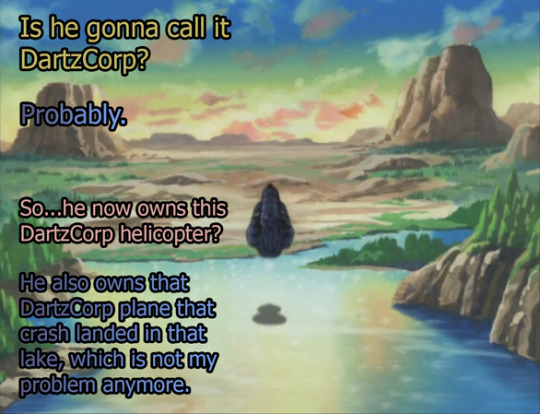
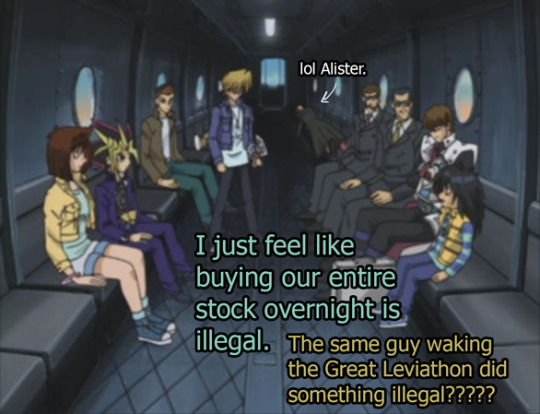
I really like this extra-long helicopter, PS.
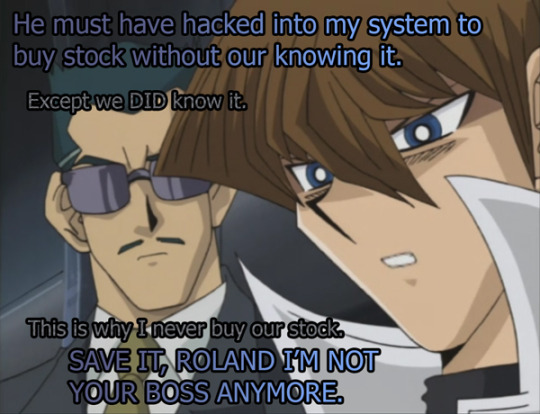
Both members of Kaiba’s Sunglasses Army decided to align themselves with Kaiba, although honestly, I don’t think anyone else in this company has realized that they’ve been bought. It happened...1 hour ago. Like what do you even do if your company randomly gets bought in the middle of a workday? Like no lead up, no indication, just BAM you’ve been bought?
And if Duke works for Pegasus who got bought out by Dartz and then Dartz bought Kaiba Corp-------What does that make Duke? Is he gonna have to start wearing sunglasses inside?
Anyway, Roland knows better than to tell Seto Kaiba he doesn’t work for him anymore while still in the same helicopter as Seto Kaiba, who already crashed one plane today and will crash yet another plane before this episode is through.
(read more under the cut)
Seto decides to align with Yugi since he needs to confront Dartz eventually. Which is when we find out that Seto always planned to align with Yugi and was just giving him a really hard time.
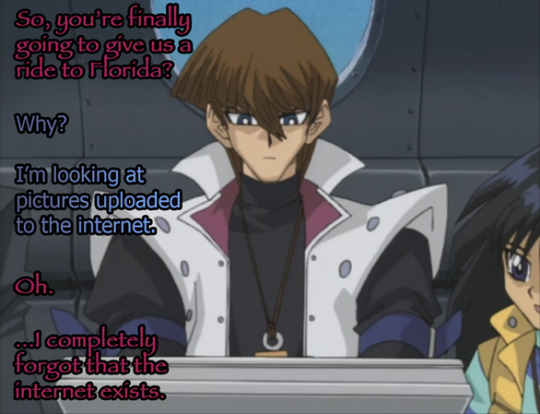
Because over the last several episodes, Seto has had an entire team at this random museum in Florida in order to take some pictures (that really should have already been on the internet but wtv, it was 2003 so maybe it wasn’t?)
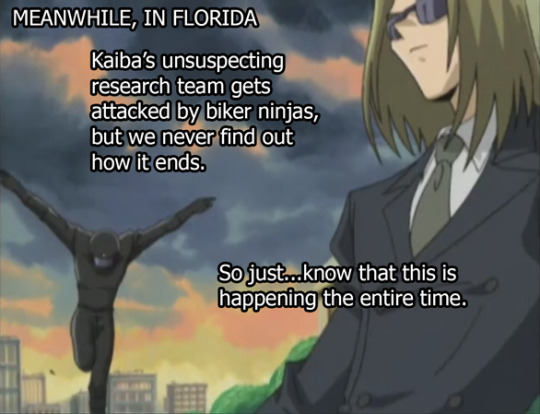
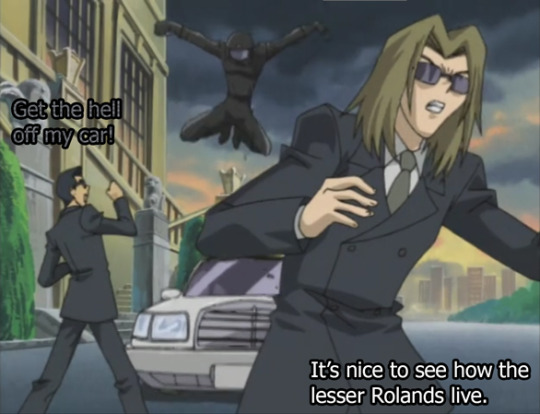
It’s like most of the way through s4 and the biker ninjas still send me. How did he make SO MANY biker ninjas? At what point was Dartz like...and now...all my mooks...will be ninja bikers. Or orcs. Mostly Ninja bikers.
Did Alister or the others ever tell him “hey, Master Dartz, I get that your 10000 years old but like...do you not understand what a biker is?” and was Dartz like
“clearly bikers are the most evil thing in the world, obviously.” completely unaware that most bikers are just 45 year old accountants.
In these scenes we also get a gander at their laptops and, if you ever want to see high level life crippling OCD anxiety in picture form, it’s illustrated very clearly right here:
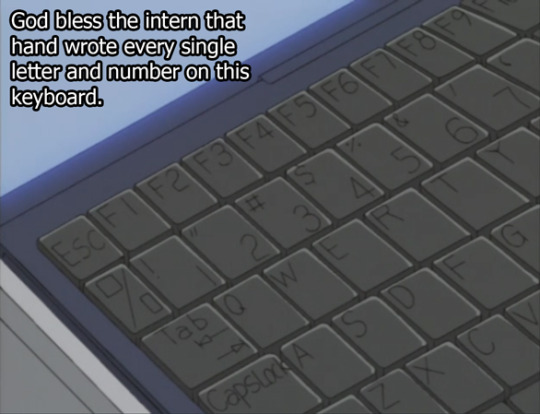
Not only did they draw this keyboard in 1 pt perspective, they used like a ruler to draw all those letters so they were the same size. Some artist put so much time getting this nice and crisp and smooth...and then this happened.
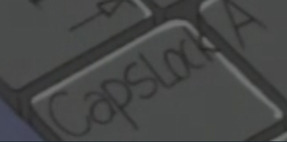
And I’m pretty sure they died after that. I’m pretty sure this scene killed an artist.
It’s at this point that Yami kinda puts two and two together and was like “WE BOUGHT PLANE TICKET’S, YOU ASSHOLES.”
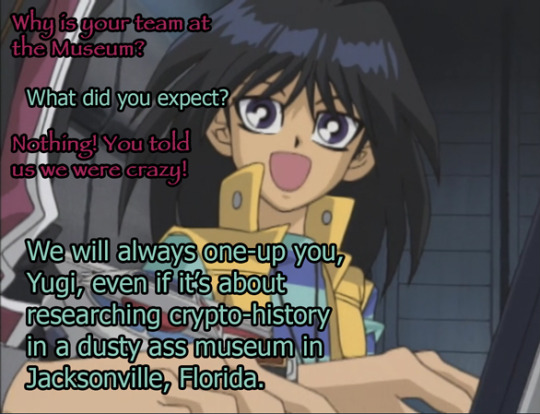
(It’s been such a long time since we’ve seen Mokuba smile like this, and it’s because he’s been hiding the fact for So Many Episodes that he and his brother prepped like hours ago to get this huge dunk on the rest of the party. He just wants to dunk on them so bad. Look at him. His company was bought today. BUT he gets to spend time with his bro dunking.)
Serious question, will Delta refund your flight if the Great Leviathan appears in the sky and tries to eat your soul to reboot the world from the ground up?
Of course not. They will never refund your flight. Trick question.
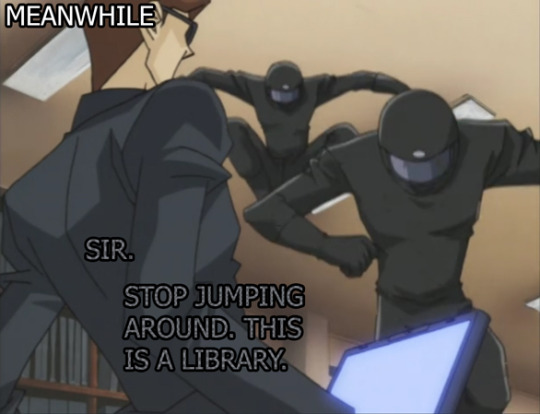
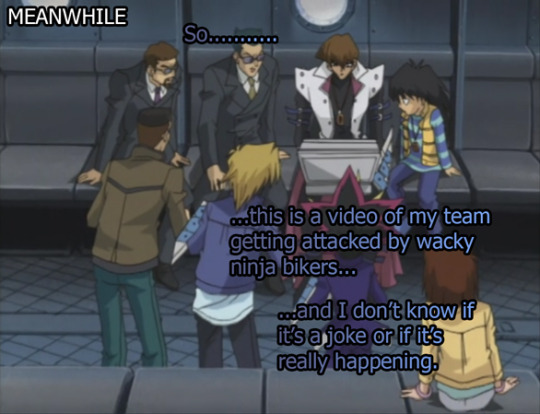
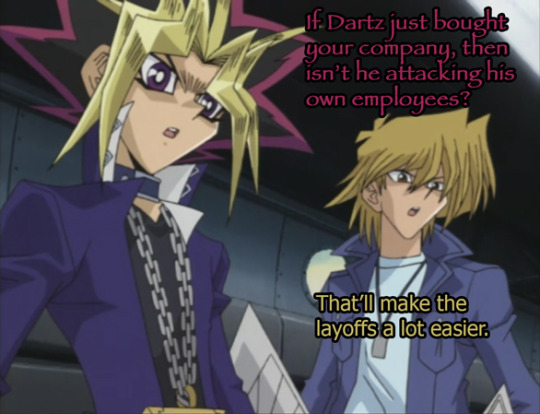

We switch back over to Rebecca and Duke, who have been absent from this show for so long, I actually forgot what Duke’s name was and had to think for like...5 entire minutes until I remembered that his nickname sounds like a poop and I was like “oh man, what name of poop would it be???” and then I recalled “Dookie. Yes. His name is literally Dookie. Wow that took way too long!”
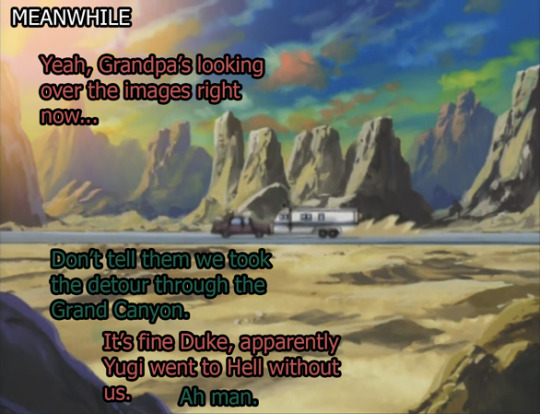
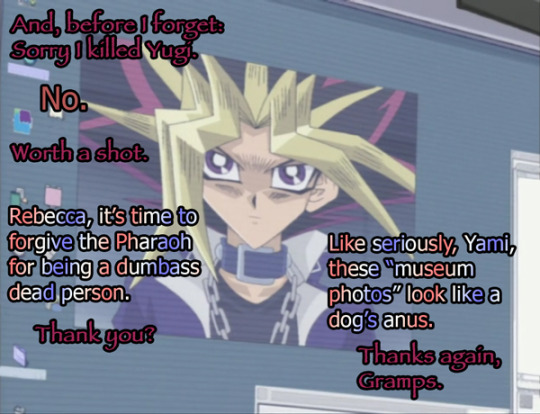
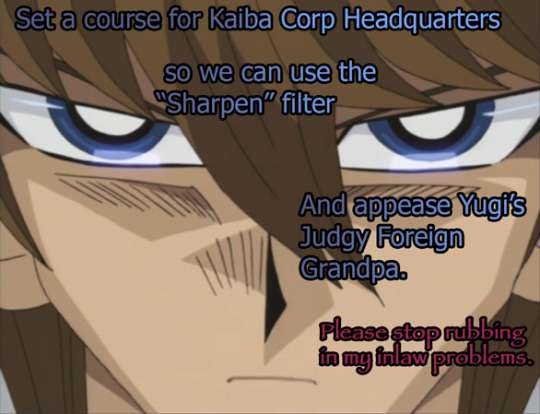
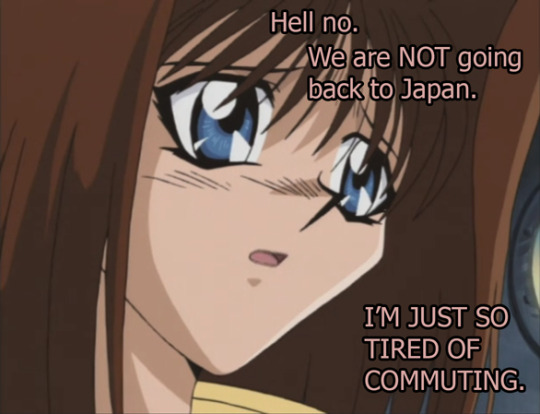
Then we start a story arc I’d to call “My Kingdom For a Sharpen Filter” where, much like King Lear, the Yugi crew splays themselves on a battle field just strewn with different ways to sharpen an image, but can’t for the life of them use any other one, but the one deep in the heart of what is now DartzCorp.

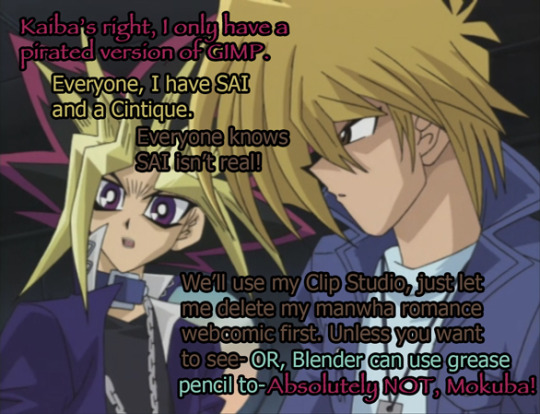
And so yes, we are going to fly to San Fransisco, hop into ye Olde KaibaCorp, and log into proto-Noah in order to read a language that Arthur Hawkins can already read.
This is nonsense, but they put it there because it’s something to do. And honestly, it’s not a card game, so I’m down for this change-up. Lets go visit a version of Noah’s brain. At least they won’t drop an orichalcos for the 12th episode in a row.
On the way, Seto decides to try and egg on Yugi.
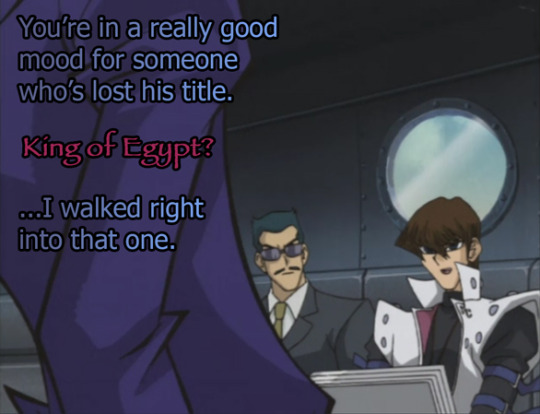
This backfires as you expect it will because Yami doesn’t freakin care. Like he’s not Yugi, he doesn’t care who the King of Games is, he harnesses freakin Dark Magic. The Wizard never cares if he’s King Arthur or not, and in fact, he probably prefers it....
..................Except in that spinoff where they had Yugi as a reincarnation of King Henry VII.
...................................................never mind.
And then Seto Kaiba says this actual line and I just...
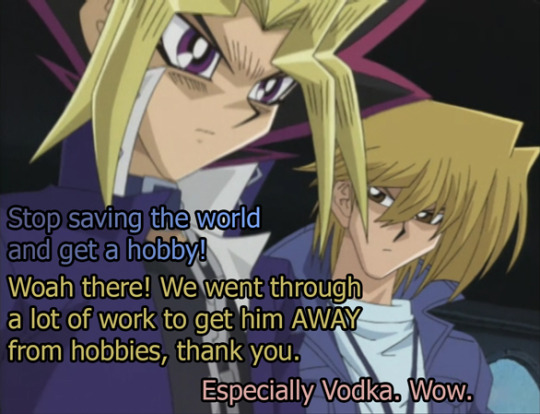
WH.
WHHH
WHAT?
This entire show is just watching Yugi desperately cling to his scary ass hobbies. The tagline of Yugioh is “1001 reasons to go back to school and get a real job.”
What does Kaiba think Yugi does when he’s not around? Does he actually think Yugi attends school or sleeps at night or works an actual job? Like...he thinks Yugi has...NO HOBBIES.
Very interesting insight into what Seto considers a hobby and not hobby.
Especially since this Yami, who spends most of his spare time farting around his scary ass brain castle and getting lost. Occasionally he is forced on a date with Tea and wipes minds. That’s it. That’s all the things Yami does outside of hobbies.
Anyway, what is Dartz doing during all of this?
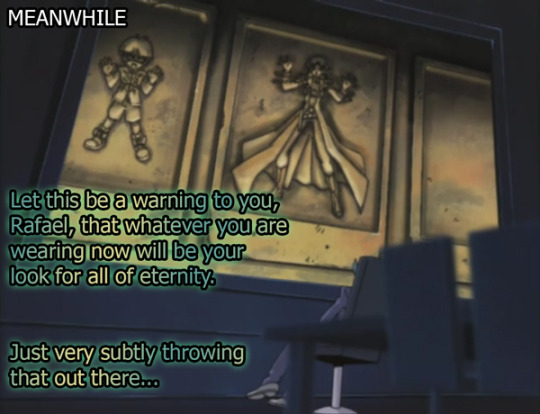
After this, Dartz pulls back the literal curtains on this room to reveal these candles that each hold the soul of someone he’s murdered.
There are not NEARLY enough candles for this segment.
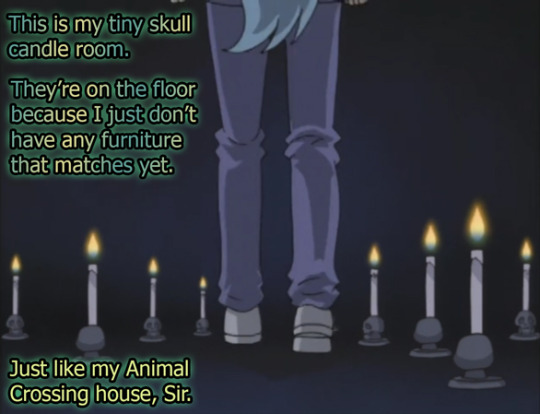
A very brave man to have candles littered on the floor when his hair is down to his ass and all of his mooks have floorduster coats.
I really want to know what the local arts and crafts store thought when Dartz strode in there and bought every single tiny styrafoam skull during the Halloween sale and was like “can I put souls in these? You sell the kind I can put souls in, right?” and then immediately pulled out like a dozen 50% off coupons like a complete asshole.
Anyway, using this candle hocus pocus, Dartz uses the Orichalcos powers to take advantage of something Yugi did in the first episode. We distantly recall there was a giant eyeball in the sky--turns out if you bust up the eyeball with, lets say, a card that has a dragon on it, the eyeball will explode into many tiny Orichalcos pieces that will fall all over planet Earth.
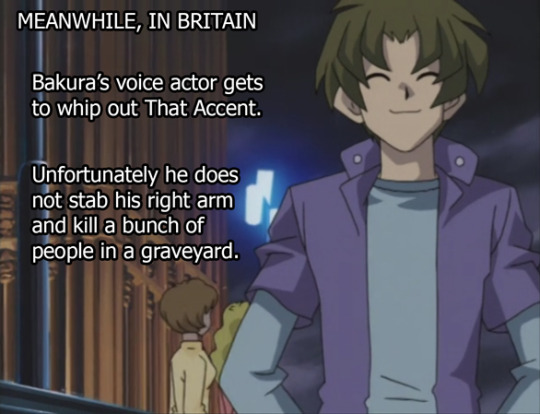
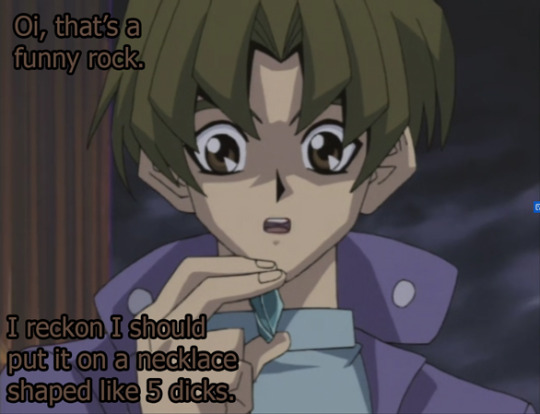
So apparently Yugi didn’t save anyone at all when he busted that eyeball, because he instead set in motion Dartz’ evil plan to eventually use these many tiny Orichalcos pieces like the one seen here, to kill the hell out of people.
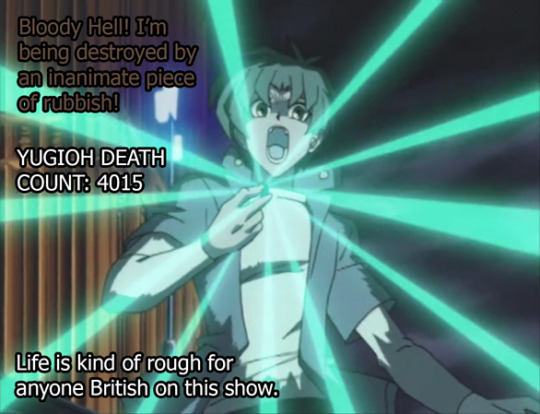
Good job, Yugi. Too bad you missed the Actual Bakura.
In fact, actual Bakura is probably the only one who survived this incident because I guarantee that Ryou Bakura is too busy eating all the contents of his fridge out of stress. He’s probably opened his window at this point, seen the crazy lights in the sky and in the street and was like “Blooooooody nope nopenopenopenopenope” and just locked the windows and doors, turned up Hercule Poirot to max volume, and stuffed his face with cookies.
(Or biscuits, I guess.)
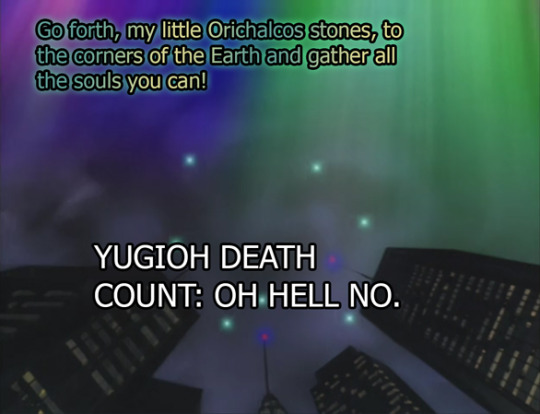

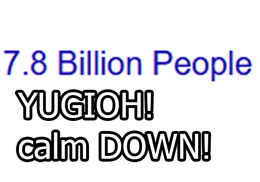
WELL.
I don’t know how to tally that.
Yugioh not only broke the tally I was using to measure the distance they spent commuting this season, it also broke the tally on the amount of people who have died on this children’s show.
That’s a really big number.
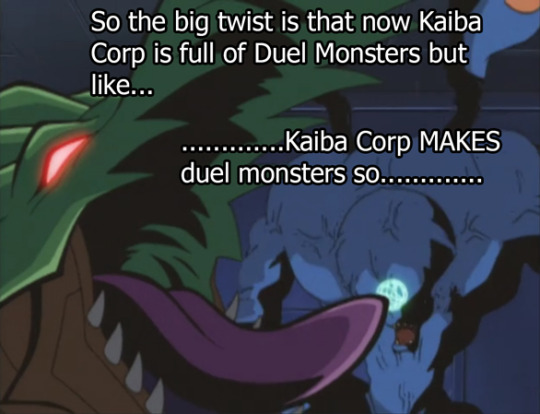
We’ve had real duel monsters for a couple weeks but youknow...this time they’re extra, extra, extra real. More so than the last times. Also they’re all Orichalcos versions of their cards so their extra edge now. They’re the hot topic versions of what were already pretty hot-topic ass cards.
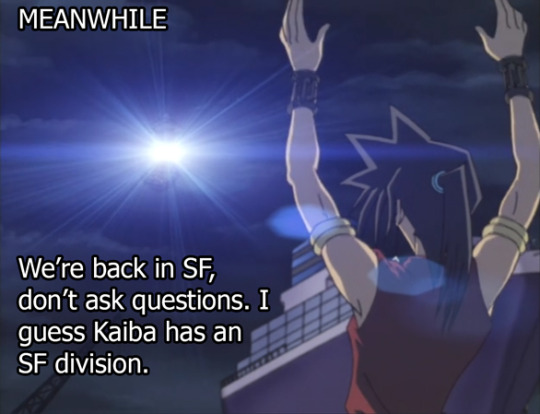
MMM. We come full circle, back at a dock, a warehouse, and some huge ass boat.
Right where we belong. Where all friends meet, where we can all finally be one.
Yugioh found one of the only cities that has a very famous and tourist heavy pier/warehouse district in it just so the Yugi gang could finally feel comfortable in their natural habitat. HOWEVER, there’s just one tiny problem in this scene, and it’s that it’s not overlaid with the actual soundscape of a SF pier, which is that of 100000 screaming seals
youtube
I don’t have a seal problem, you have a seal problem.
Anyway, the only healthy adults here attempt to follow the children into danger but someone on the animation team was like “we just lost the keyboard drawing guy to that capslock! We cannot lose any more interns to a crowd scene with 9 people in it and 2 dead bodies!” and they uh...
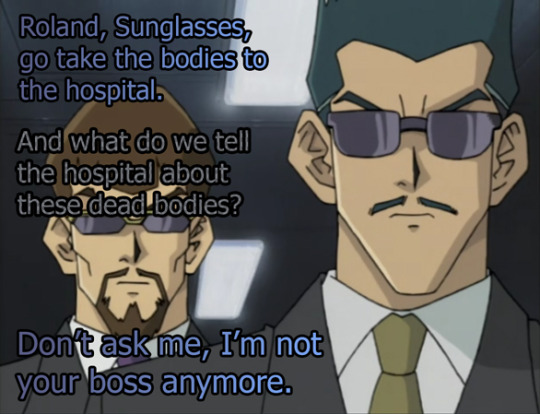
And we immediately eject Roland and whoever that weird sunglasses guy is out of the script. Mokuba gave them a longing glance as they helicoptered away. Maybe because he missed his Dad stand-ins that he went through such efforts to call in the first place. Or more likely, because Mokuba would have preferred to be on that helicopter and far away from whatever the hell is going to go down on this dock.
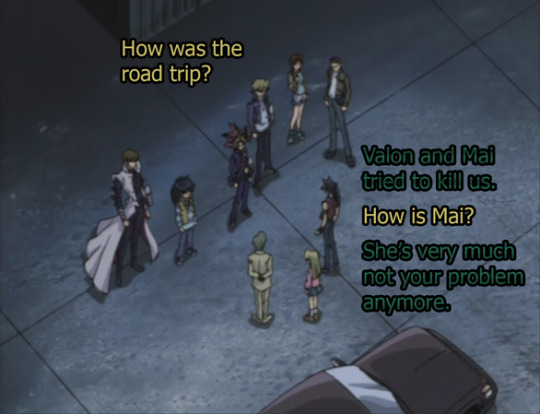
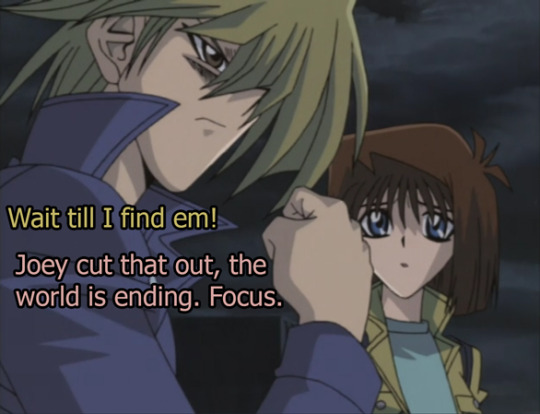
Honestly the rest of Joey’s storyline this episode is him going rogue because of Mai rage, and it both comes out of nowhere and also seems very on point for him.
Meanwhile, Rebecca’s unbridled rage towards Yami Muto is still low key hilarious to me.
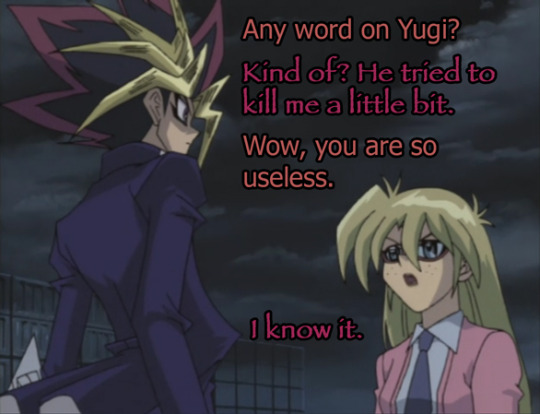
Witness the only character here who thinks Yami should suffer actual consequences and witness Yami just appear to not give a single damn about it.
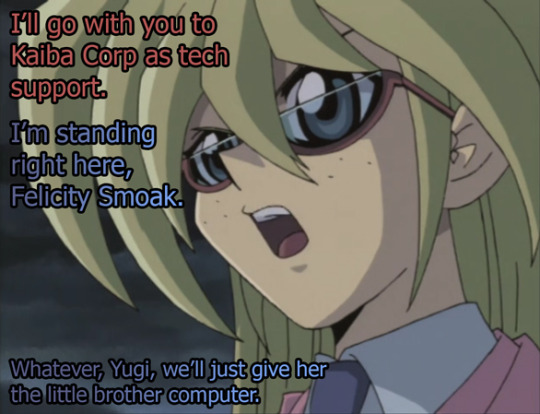
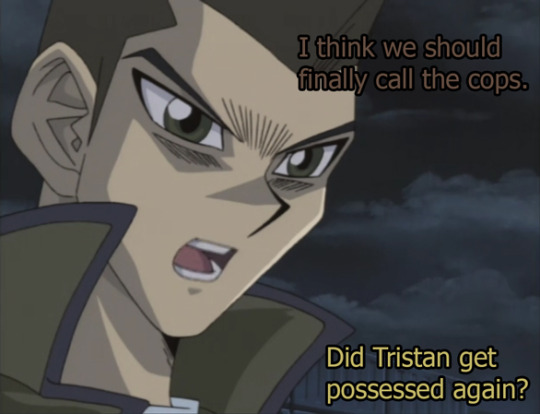
Nearly spat out my own drink watching this.
The...
...police...
...exist in this universe?
Anyway, while Tristan and Tea try to locate a payphone to dial 911, Seto and Yugi decide to invade Seto’s own company by going through an elevator that you have to reach through the sewers.
Straight up I don’t think SF even has sewers. At least, not in the sense that you can walk in em like New York or Paris or other cities that have sewers. Our sewer systems are very small cuz we got something called “liquefaction” which means our ground is so soft (and artificial--a lot of the land is fake), that when there is an earthquake, certain parts of the city will...liquefy. It’s Terrifying. We kind of...avoid going and building underground except in certain stable places. (like even BART gives me the heebies.)
I just have a very strong distrust of basements, caves and other underground places in general and it’s not because of spiders, or ghosts or whatever, I’m just afraid of faultlines. It’s like having an active volcano, but you just don’t see it, and we haven’t had a Big One since 1989 so...any day now (I mean, 2020 has been such redic content, that I think we’re finally ready)
Again, Japan has way more intense Earthquakes than we do, and yet they have a billion underground subways and very, very tall buildings, so like, this is mostly a big cultural difference between the two of us. And the bedrock. They probably have better bedrock than we do (honestly, I just have no idea).
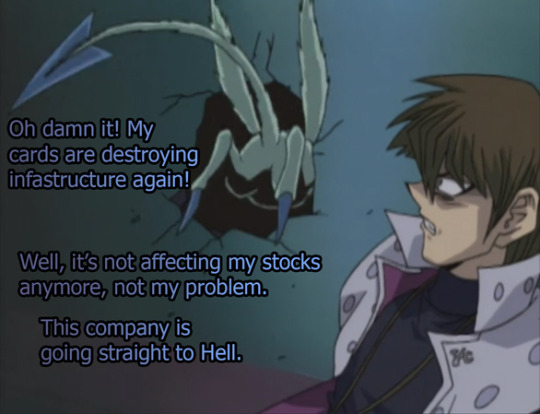
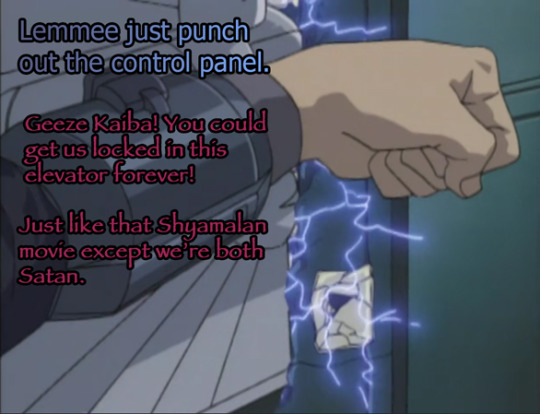
MASTER HACKER SKILLS.
Almost as good as that time he hacked into Pegasus’ company by dropping a satellite on it. I’m starting to think Seto actually doesn’t know how to use a computer.
Anyway, Seto is faced with...real cards, real monsters, indisputable evidence, and he decides, it’s time. It’s time to finally face facts.
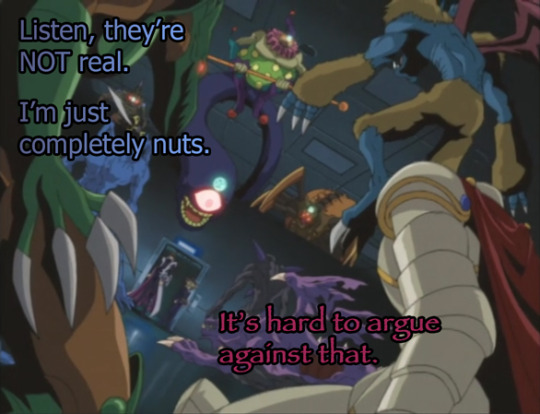
So, while these two are just flinging cards around willy nilly, Tea and Tristan are ...actually talking to police.
4 seasons. They’re actually doing it.
Although, TBH, they probably should have gone to the Japanese Embassy first? Just throwing that out there.
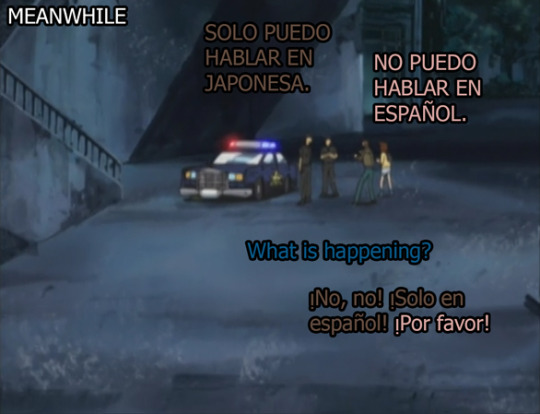
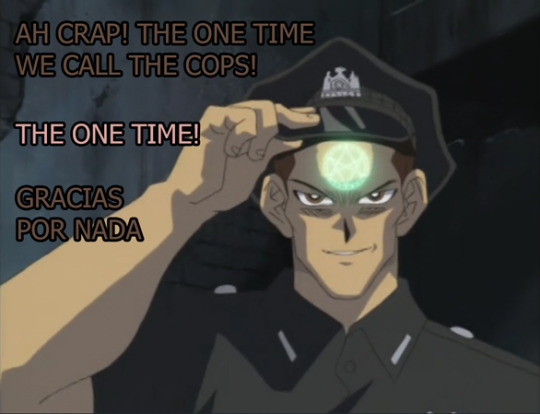
Ah Yugioh, the only kids show around that tells you point blank not to trust cops. Timeless.
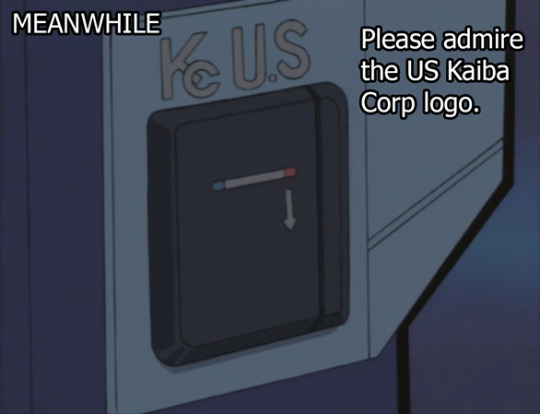
U.S
In some weird underground earthquake hazard, Rebecca proves that she is smarter than Seto Kaiba. She’s maybe even the smartest person on this show. Nice that we gave her nothing to do this season but pine over Yugi who is already taken by Tea who he is also not even dating.
Not that I love Rebecca or anything, I actually have a hard time with her voice, but like...they really dropped the ball on Rebecca.

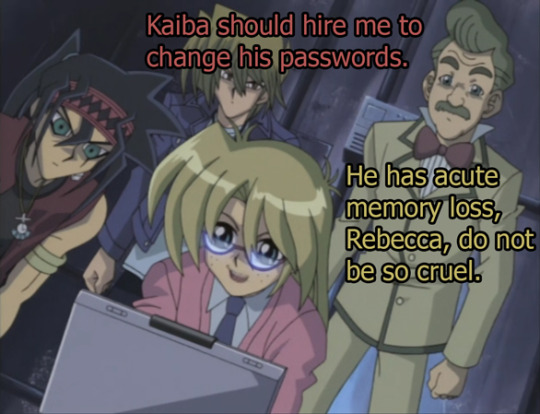
If she does end up joining Kaiba corp as their back up Felicity Smoak while Seto just runs around aimlessly punching stuff that really is just offbrand Arrow but with cards. And with slightly less resurrections.
So, lets get a gander at that computer.
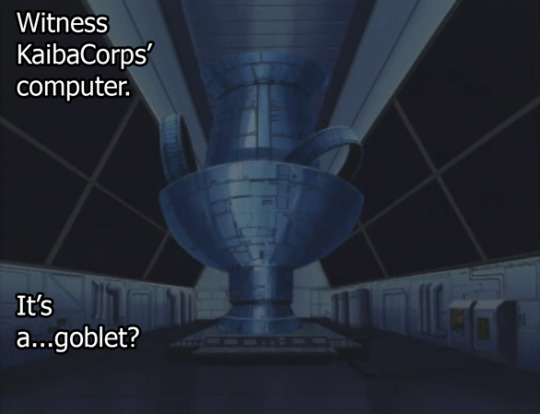
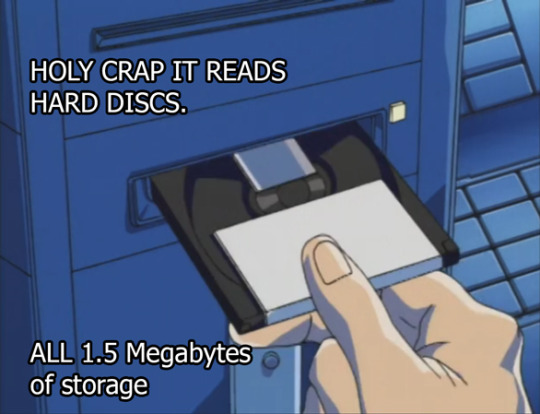
We didn’t get to see Kaiba pull out 12 other discs to complete the installation process for these all these Hard Discs. Maybe the lure of throwing a very aerodynamic CD across the room like a paper card was so strong that his dev team forced him to switch to these defunct squares?
PS, I am a true millennial, OK? But, I don’t remember Hard Discs.
Hard Discs were SO long go. I stopped using these damn things in Elementary school. The last Hard Disc I ever touched was in college, when I had to put my art portfolio on a disc to submit it to my degree. I don't know even why. Everyone had a mac, so I knew no one’s computer in the department even...HAD a disc drive so it was like...whomst among you has this damn computer from 1997? Whomst among you is still using Windows 95? WHY would I put IMAGES on a floppy when I can just email them to you?
Anyway, I had to get a USB hard disc reader, and to get that reader, I had to call my Dad who had legacy software because he’s a computer engineer, and he had to mail it to me.
In that same portfolio review, PS, I also had to submit my portfolio as slides.
I didn’t even know where to produce slides so I had to ask all these old people and go to the last photo processing store on earth to get digital pictures turned into negatives and then turned into freakin slides.
SLIDES.
I honestly think they just did that to weed people out of the art degree.
Anyway, I tell you this story just to say that there is no way in hell that Kaiba was using a hard disc during the height of the CD era. We were CD or go home since 2000. We had pretty decent jump drives at this point. We had wifi. It was realllly bad wifi, but we had it. Your phone could connect to the internet. It would charge you 50 bucks, but it COULD connect.
Who on the Yugioh team DID this?
Anyway lets see these pictures that for which, we spent thousands of dollars in unused plane tickets, destroyed a Caltrain, killed 2 ancient Atlanteans (and their dog), killed 3 random mid-villains, walked across the entire Peninsula, crashed an international plane, and left both the plane and the train to rot gas fuel into the nearest lake which is right next to a ghost graveyard?
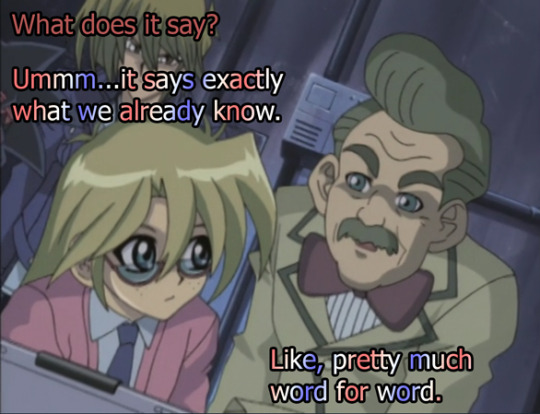
Yeaaaaaaaaaah!
Like he reads it and is all “They’re gonna resurrect Atlantis” and it’s like WE KNOW. Dartz and his hooligans have talked about starting their Utopia to reboot the world since Gurimo. Since Day 1.
Man.
Anyways, there was one plus to the pictures, and it was that Seto Kaiba recognized the Oricalchos logo.
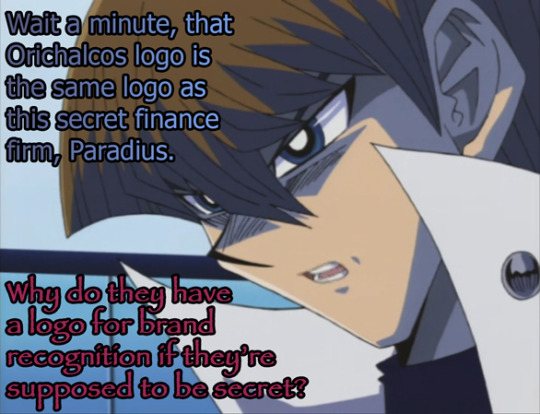
just...
The Oricalchos logo is...
...This logo, Seto?
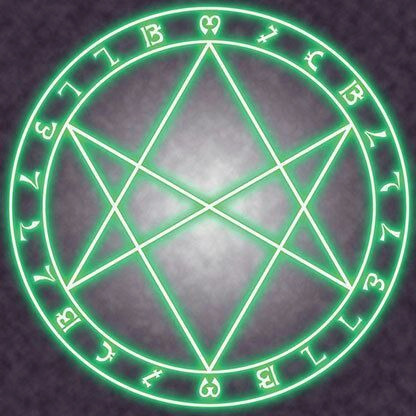
You...didn’t recognize...seriously? Not until just now? You have been inside of this logo, rearing to lose your soul to Alister 2 times, and he only recognized it...just now.
I mean Seto takes a while y’all. He’s a genius, but his memory is so, so bad, that he will Eventually get smart, but you have to wait until like episode 24. But he’ll get there. Just gotta be patient.
And, when he saw it, he wigged out in a way I wasn’t prepared for.
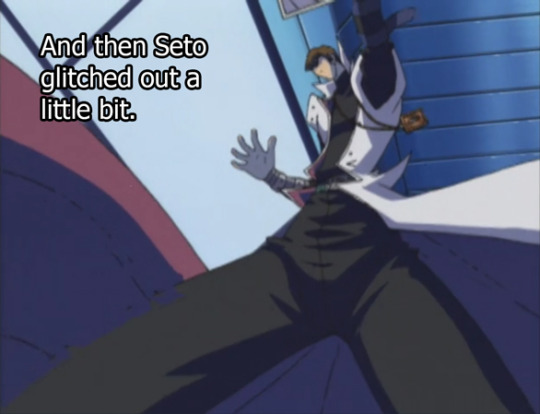
Y’all I feel like I’ve seen to many weird zooms on Kaiba’s crotch in this show. Or just in life in general, especially after that surprise fic. That’s all.
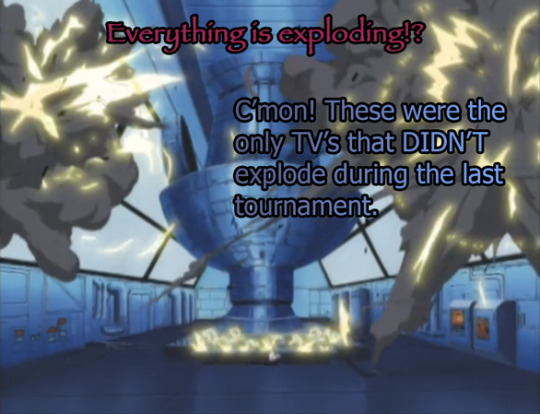
I don’t know why everything exploded, but maybe the logo is cursed in the same way as God Cards? I dunno.
Anyway, this is when Dartz shows up with his brand new dog.
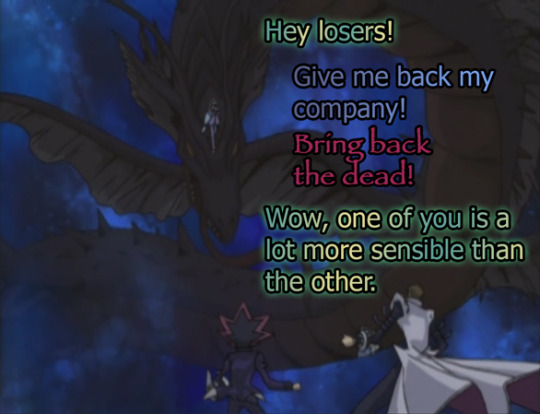
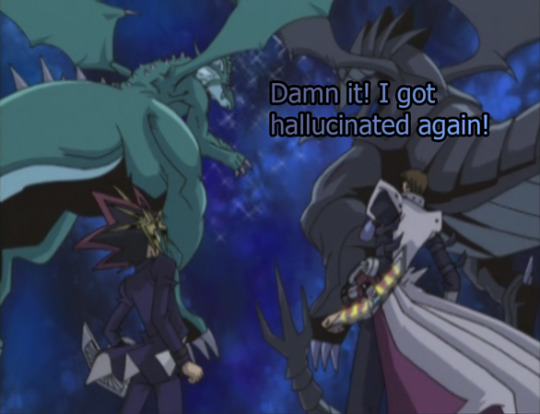
So they run outside onto the roof.
Now listen, does every Kaiba Corp building need the same weird ass roof? Is it like a McDonalds?
Because I’m just picturing this type of roof in SF and I’m having a time.
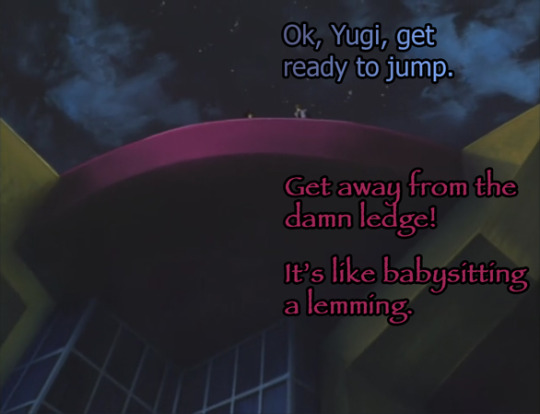
Forgive me if I made this lemming joke already. He’s just stood on a cliff’s edge so many times I can’t keep up.
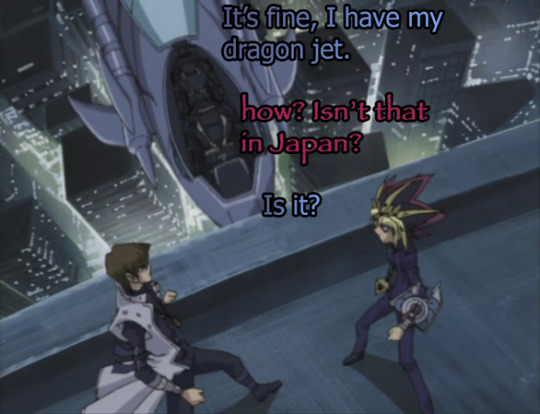
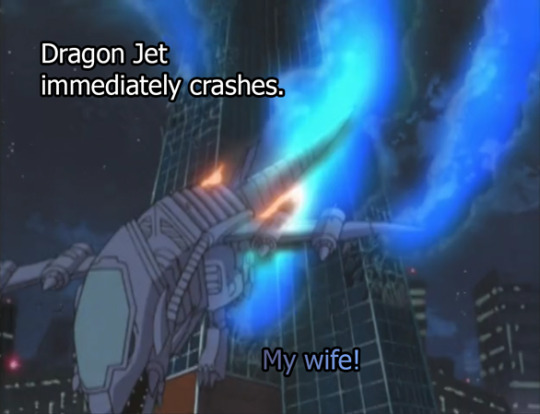
RIP Dragon Jet, who took us from S3-S4, you’ll always live on in our memory, you glorious, wasteful, beautiful death trap.
Seto and Yugi are fine by the way, they just kinda jumped out, as you do when you’re an immortal god possessing a small boy and a...whatever the hell Seto is.
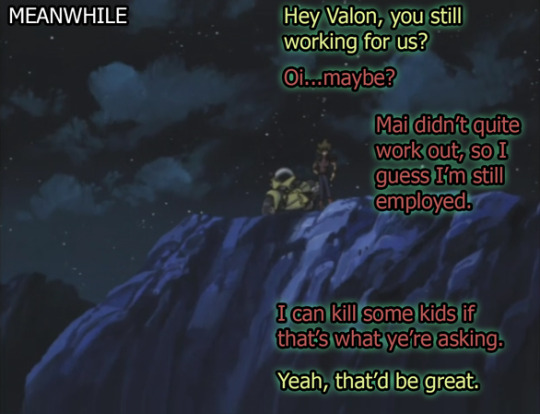
It’s at this point we reintroduce Valon because Joey went rogue and has decided to take on Dartz by himself. This is what happens when Tristan leaves the party. You always need Tristan to hold back Joey by his armpits to keep him from fighting random people.
So I guess Valon’s gonna die next episode. That’ll be nice.
What’s great about this show is each arc is just watching each villain die. You know they’ll die. But...how much?
Anyway, that’s all for today. I’m still drawing a hell ton of stuff so I don’t know when the next update will be...but just now I haven’t dropped off or something. I’ll...eventually get to it.
And if you just got here, this is a link to read all of these in chrono order.
Anyway, I mentioned Hercule Poirot, (because watching a hell ton of BBC was how I spent time with my family when I was a kid, and my very Southern Grandma freakin LOVED Hercule Poirot) So here is the best subplot of that show, which is David Suchet eating stuff.
And which doesn’t want to embed for some reason. Probs can’t embed more than one video https://www.youtube.com/watch?v=17antzzJrzQ
#yugioh#yu gi oh#photo recap#episode recap#yami#yami muto#seto kaiba#crashes a plane again#dragon plane#rip in our memories dragon plane#mokuba#joey wheeler#tea gardner#tristan taylor#has to now avoid the cops#dartz#rebecca hawkins#duke devlin#man there were so many people in this episode#S4#Ep24
50 notes
·
View notes
Text
@peggystormborn I think Iris Barry is the exception for a variety of reasons (imo partially race, partially the committment of the writers to the couple). But Oliver and Felicity did A LOT OF triangles before they committed and some of the writing for them was terrible on the romance front. People like to just remember the endgame, but they forget how terrible the road there was (Laurel, Sarah, Oliver marrying another woman, Oliver having a child with another woman, an entire crossover dedicated to a fantasy wedding between Laurel and Oliver, evil!Oliver being married to Kara). Granted in a lot of ways it was because Felicity wasn’t the original OTP and I think it took Marc Guggenheim a long time to finally accept it (I think he’s one of those writers who deep at heart doesn’t really like romance at all, and just eventually only grudingly accepted it, but I think the earlier seasons feel like there was a lot of latent animosity from the writers towards the storyline).
(and one can debate how Barry/Mirror Iris is something like a triangle, even if it is a triangle made up by writers who desperately want to maintain the “pure” status of an OTP, I mean, as long as you don’t think too hard about the implications of Mirror!Iris [I also think that the fact that Iris and Felicity predominantly don’t have superpowers makes it slightly easier for them to work as a functioning couple])
People thinking that the writers have handled Kara’s Kryptonian relations poorly doesn’t change that if the topic does not interest the writers they are not going to write it (and if they write something really tonedeaf about it, that is usually a sign that they don’t really care about a topic). It’s a very common trait of fanbases to take certain topics more seriously. Criticisms of co-dependency and calls for therapy are very, very common examples of this in a multitude of fandoms.
You have this all over the Supernatural ending, with people saying “Dean was acting suicidal for years, it sends a horrible message that the show ends up with him dying” and “John Winchester was a horrible father, it’s a horrible message that the show ends up with him being in heaven as part of Dean’s personal heaven and the show never doing a story where Dean recognizes that John screwed him up and fully breaks ties with him” and “the brothers were co-dependant, the show getting rid of all the characters who are not them and making the ending exclusively about them is a horrible message”.
I think it’s pretty clear that these things weren’t written because the writers intended to send that message, they just clearly see the characters very differently and many things the fans obsess over they see as just not that great a deal. Fans often latch onto characters and stories because they see part of themselves in them and project their own experiences and their emotions about those experiences into those characters (look no further than Lena’s fans and what they think is most important about her character). Fans also love their characters and want their angst to be explored, while most shows just want to keep the plot going. That’s why you will have amost every fandom clamoring how the show should do a therapy plot for their favorite character. To them that makes sense, they love their favorite character, so them sitting on a couch and talking about their feelings of course is going to sound fascinating. Doesn’t mean that the writers tick that way at all.
Supernatural can show pretty clearly how there can be a fundamental miscommunication between the fans and the creators. Where maybe writers might think that Dean’s dogged loyalty is his most fascinating trait, while fans might think his angsty woobie appeal is his most fascinating trait and his loyalty is boring or just a jumping off point or even actively harmful. Social media and fandom, I think it just has a habit of attracting people who have problems in their real lives and they are likely to project their own problems into these characters, but that does not mean that the writers are anywhere the same headspace (particularly in regards to how abusive or co-dependant a relationship is, I think just like with John Winchester, writers are way more likely to have a more positive view towards relationship and stories like that, because to them, those relationships are something good in their world because they are drivers of drama, providers of dramatic scenes).
And I think history has shown, no matter how annoying it is to the fans, new showrunners just will not be beholden to the themes and messages of previous showrunners. They will pay tribute to whatever part of previous seasons they like, but they are likely going to come in with their own spin, their biases and their own takes of the characters.
(for what it’s worth, I theorize season 4 started out with the plan for a sister season, to explore (via Red Kara and Elseworld and Amnesia) what is Alex without Kara, what is Kara without Alex and they just sort of lost the main plot somewhere in the middle between introducing Nia, introducing Lex and poorly thought out political metaphor)
Right now, what little we know of season 6 makes one hopeful that it could have a significant Alex and thusly sister focused plot, with Alex playing around with being a vigilante and there being rumors of another young sisters episode.
What is interesting about this is that either of Alex most likely developments, Alex becoming a hero in her own right OR Alex finally getting her baby and family provide interesting jumping off points for Kara to reflect on her own life. This does not mean that the writers will actually take this opportunity seriously, but it is at least possible.
Alex has been a physical fighter working with Kara since forever, but her getting her own costume could be a signal that she is getting her own hero identity. Alex being her own heroic person rather than just the no-name who supports Kara ideally should be an interesting change up in their dynamics. Either with Kara cheerleading and supporting Alex they way Alex has always supported her or with Kara realizing that maybe she has to step back a little and let Alex be her own hero and trust her that she can handle things on her own (potentially culminating with Kara leaving the protection of the city and Earth in the hands of Alex).
I could picture Kara having a relationship with William and eventually rejecting him symbolically but I just really wouldn’t expect it to be about Argo. But I could picture a plot where seeing Alex thrive as a hero makes Kara think she has the freedom to kick back and focus on her romantic relationship or focus on being just Kara Danvers for a while (and in the end realizing that that is not enough for her, I just would expect this NOT to be about Kara Zor-El but about Supergirl, Kara realizing that she needs to be Supergirl to be happy even if being Supergirl has made her life more complicated in many ways).
On the other hand, if Alex were to finally get her child wish fulfilled it could a be a good story to explore what the equivalent is for Kara (while with Alex, she has always been protective of Kara, so her having somebody else to raise and be protective over would also provide good emotional dramatic potential).
But it could just as equally be that they parallel Alex being happy with a baby and a girlfriend as their little family with Kara just getting William as the nice unproblematic understanding boyfriend, forming their own family unit albeit without a child. Or it could be Kara just getting gratification of being a supportive and loving aunt. You never know. Supernatural shows that just because the fans are convinced that the show will go one way (Family is about more than blood ties! The show will end with showing how Sam and Dean have evolved beyond “the two of us against the world!” and their family unit now includes Eileen, Castiel and Jack) doesn’t mean that the writers see it the same way.
It’s very interesting in how this reaction mirrors the reaction to the How I Met Your Mother Finale where the writers thought it made sense to circle back to the start and most of the general audience disliked it because they felt the characters had developed beyond the original premise. But it still shows how this particular pattern of thinking is one that writers are very likely to fall into.
Finales often have a way of exposing whether one’s (or even the audience in general) perception of the characters and their relationships and perceived moral takeaways align with the one’s of the writers. I don’t even think that that is something that can just be “fixed” by telling writers “don’t be the Game of Thrones finale, don’t be the HIMYM finale”. If powerful writers just have a certain perception of characters, that’s just how they see them and they can’t just break out of.
I guess one can argue that maybe it’s a sign of poor writing (even if it might be good business sense) if a show supports such a variety of readings till the very end (are we watching a story about co-dependant siblings which should end with them lovingly and supportively letting each other go? or are we watching a show about siblings through thick and thin, more powerful than anything?), but I think in some cases it just arises naturally because of the way fans can project themselves into characters in ways that was not intended by the writers and that can’t fully be controlled by them (and since those projections are heavily influenced by people’s very varied personal experiences you also can’t just please everyone).
5 notes
·
View notes
Text
Homesquared Chapter 4
I cheated and some of my chapter 4 thoughts leaked into the chapter 3 post lol
Mostly about the pretty obvious Garden of Eden metaphor Dirk is for some reason setting up for himself and Rose as Adam and Eve
and I was about to say which begs the question of what the heck role Terezi is supposed to play as but then it’s very obviously as the Snake in the Garden
Terezi is very much just barely holding back some irritation towards how Dirk is treating Rose, but she’s also very intelligent and is aware of How much Dirk sees/knows and controls about their situation, so she’s probably leveraging her powers over Mind as much as possible in order to stay hidden in plain sight from Dirk’s narrative
and she does so in a way that is one of Dirk’s only blindspots - How Mind and other people have an effect in the determination of the Soul/Heart
By acting in a manner and doing things in a way that aligns with his expectations of her, he assumes and pigeonholes her into a type of character and bases his predictions of her behaviors off of that archtype, never expecting her to act outside it, and when he sees her actions and thoughts and desires all align within it, never questions that it might one day change or was different all along. Dirk’s never really been good at reading other people, can’t see without the lens of “how would I do it” blinding him to things he would never think to do, a trap that he keeps falling into with his friends and one he’s probably trying to overcome by becoming Ultimate God Person/combining all perspectives into his own and uncovering blindspots like that
But right now Mind is the darkest thing in is corner still and I think he sort of knows that as well
Terezi walks the crazy wiggled line boundary between their two Souls that defines who each of them is, as expertly as a person on a tightrope, never wavering until she reaches her destination, at which point she’ll leap off of that line and leave Dirk scrambling to try and calculate her next move/who exactly is she/what her goals are, since’s it won’t be following the clearly defined Heart boundary he’s used to drawing his plans by, so she’ll have to choose the perfect moment in order to entice Eve of the Apple of Revelation once more, heck, she might even do that so sneakily that she gets Adam to take a bite as well, since as soon as Rose bites it she’ll have an ally with her against Dirk.
For God created the Serpent originally as well, so thus why did he not imagine it’s betrayal and prevent it before it could have happened? Or else why did he create something he knew was going to betray? Eden was a paradise, so why intentionally create Evil in that paradise?
If Eve corrupted Adam and the Snake corrupted Eve, Who exactly corrupted the first Serpent? That’s something that the bible never goes into really, at least in Genesis, except to say that the Snake was punished for it’s action to forever crawl the earth eating the dust of man’s heel, punishing all snakes, as Adam and Eve’s punishment punished all humans
(Later I think the bible would try to say that the Snake was the Devil all along, but then why punish the Snake and all it’s progeny for it? If it was the Devil’s doing that undid Adam and Eve then why punish them for the Devil’s actions they would have no way of guarding against or now way of knowing it was a lie? Was it not God’s failure? The Walls of the Garden of Eden were supposed to protect his perfect creation afterall)
Gotta say though I really Rose’s design
I would call her Evil Rose, but she things she does she does in ignorance, not really out of evil, it would be like calling Eve evil for listening to the Snake when she was purposefully blinded to it’s intentions by her creation by God.
Once again we get this idea of Knowledge and Choice affecting eachother, Well I say again but really I’ve been watching RWBY a lot lately and the idea that you can’t make a real choice without real knowledge comes up a lot in it’s mythos and it is really applicable here
Terezi’s design as well is incorporating a lot more Red, she really dug those red shoes aesthetic but gave it her own twist, she’s got a red tie, her ever present red cane and glasses and even in that shot of her her horns look more red and solid as well, even though i know it’s just the lighting
So really digging the whole Terezi is the Apple/Snake in the Garden metaphor, she has also been having that tendency to just snack on random plants, intentionally for her own or Dirk’s unaware benefit or not, it’ll make it that much easier to her actions of later betrayal to be seen as “in character and therefore expected and not dangerous” instead of pre-meditated and actually dangerous, to him
And then they start waxing about their various philosophical babble, Dirk seems really determined to also use this to try and figure out that whole problem of how other’s affect the self, he’s trying at least, I think, in his own way. But not for a good reason, not so that he can have a real understanding of that, but because he wants to use it to guard his own self even further
He’s maybe not using Rose here as an equal player, but more like a wall to bounce his own ideas off of and test them, like using a neural learning AI to test ideas or an actual literal wall in a game of table tennis.
Heh, I got a chuckle out of the fact that Dirk’s answer to the Ship of Theseus problem is “why does we even have to remove and replace parts of it, why not keep the original pristine and eternal?”
because it’s funny how avoidant of the problem that answer is, man he really really is uncomfortable with the idea of changing the self in any way
“He's avoiding the question again. It's amazing how one can technically have the maximum amount of metaphysical personal awareness possible, and still not notice these sorts of things. “
SAYS LITERALLY YOU but honestly this is just more fuel to the idea that maybe he can make a genuine connection and understanding with a person if he can recognize how he and her are the same
“It's stuff like this that makes me wonder sometimes whether there's anything about myself that I'm missing. Then I throw that wonder in the garbage can and turn the incinerate setting on.”
but nah he’s still firmly denying that possibility, he’s almost actually equating his trauma of self erosion with the idea that making friends and understanding others changes the self in subtle ways as well
He can’t even stand the thought of his own close friends influencing him to be different in small subtle ways or adjusting his behavior for others because that STILL counts as a change of self that he didn’t authorize or choose.
Also can’t help but by be reminded of my wacky little fan made Gamma session I made forever ago by them using the name Delta-Detritus and basically be like alright, what if we do SBURB again but BETTER/worse this time?? Which is essentially the thread that most Homestuck fix it fanfiction tends to go towards
Though I am curious now
We got A/Alpha for Alternia which is based of off “Alternate” introducing the trolls as an alternate race to Human Earth
B/Beta for Beforus which is based of off “Before” introducing the planet of trolls that came before the first group
And then Earth C, now, there isn’t a letter C, the third in the greek alphabet is actually Γγ Gamma, (and the fourth is ΔδDelta)
So I wonder what “name” Earth C really has?
It feels like it should either start with C OR with GA, as Alternia starts with the AL of Alpha, Beforus starts with the BE of Beta and same with Deltritus and Delta
As as “Another for Earth” Gaia isn’t a terrible option all things considered, now you just have to make it sound like a word which describes it’s use to the narrative
It’s is a very split place, having the two timelimes Meat and Candy associated with it, as well it does feel extremely mercurial in nature, being a sort of crosswords between Homestuck and Homesquared proper, and really exists in a place between stories, an ephemeral epilogue of sorts
really a merger of Gaia and Gemini feels the most appropriate here, like Gamini, also the word mini stands out in there as well, knowing that this Planet is sort of on a lesser status compared to the other three since it’s not going to be the birthplace of a session, also has the word Game in it
But then people will wonder why it doesn’t begin with a C since it still is called Earth C so *shrug*
Honestly C K and G sounds are all very similar in the tongue, so maybe it’s both Camini and Gamini at the same time OH FUCK CA AND GA, ONE HAS CALLIOPE ONE HAS GAMZEE? SHIT IM ONTO SOMETHING (no im not)
I like Camini now better, it comes from a place of Gamma/Gamzee/Game/Gemini but ends up being more about the twinned Ca’s that were used to, Caliborn and Calliope and fits with the establish Earth C theme
So there you go, Earth C’s actual planet name should be Camini
which also works because:
Camini
home stove/furnace
smelting/foundry furnace, forge
vent (underground fires)
according to the latin language this word also has multiple meanings and many Irons in the Fire, I think the fandom will appreciate the name haha
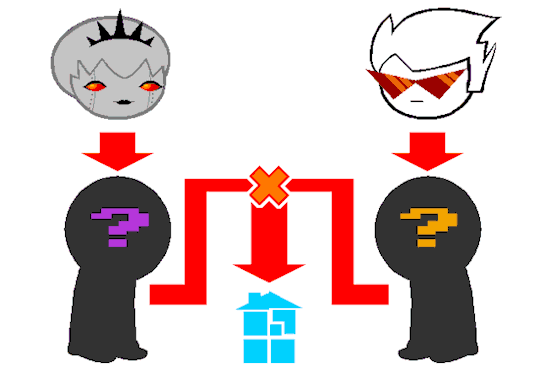
Yeah both races are definitely going to both be playing one game of SBURB, despite what Dirk is intending, the pic does make it really clear
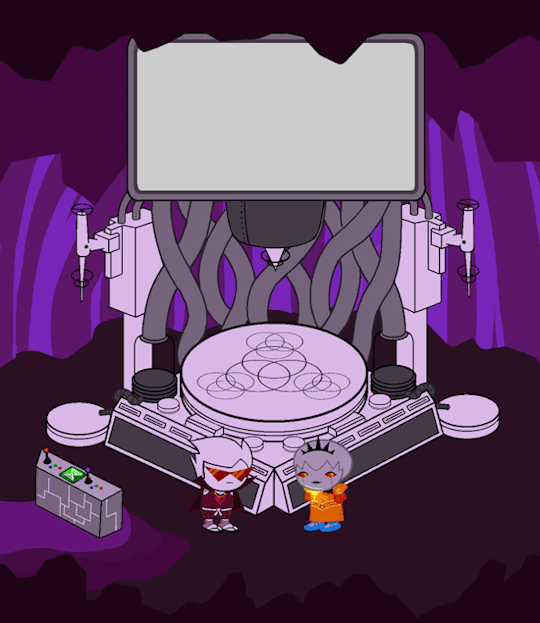
There’s something to say how Dirk seems to be represented by Purple and Rose by Orange in this here and then how all of the cave is a backdrop of that same purple.
Look at even the controllers on the machine having purple and orange knobs, even being solely on Dirk’s side of the image
I guess Dirk intends himself to be the force behind Derse, since that’s the force that always “wins” and Rose fitting in her place as the ultimate loser (since of course Dirk will want to win his own game) but also to be like Skaia the force of Prospit
So Dirk intends to be a whisperer like a horrorterror, choosing to manifest his influence that way, while Rose will give visions to her race like Skaia?
makes sense honestly
but again even with the themes of duality, the theme of the trio is bright and center in that piece of ultimately technology, the third influence hidden unseen in the furthest corner behind the curtain of snakelike tubes and wires that Dirk will not expect to interfere, or even have the capability to interfere, Terezi
heck it’s even in the buttons next to the controls being colored red blue and green
there’s so much duality in homestick with destructive red and creative green but then there’s also always been that mercurial breathy blue as the third

God, tell me that doesn’t look like a baby proto horrorterror
I can hear it raging it’s revenge against it’s cruel human creators even as I type
No wonder they become associated with destruction, they know theyre the pawns of two heartless cruel god children playing at life like it was a game
Rose you MUST KNOW how bad this is, it’s not a theoretical discussion anymore, that things exists and is alive and has feelings and you did it to that
and that thing is technically a Dirk too
Is this how Dirk get’s his revelation? Or downfall? As his Heart is unwittingly invaded by the horrified cacophanous screams of his grotesque tortured progeny crying out for his blood?
His end unintentionally ending up as the thing he feared most? Inner self destruction caused by his own sharp and bloody splinters turned and pointed inward, tearing himself apart with the pieces of his own Soul? Caused by his own Hubris?
I will say typing that all out is pretty good
I’m just sad the same will probably happen to Rose too though ): Maybe she’ll make careful more humane species? Something that has the potential to exist and be happy as it’s own creature while Dirk just creates monstrosities forever in conflict with Rose’s race?
They’ll each be the master of their own eventually destinies I suppose but Homestuck seems to have a good track record so far of the Ultimate Female Creator being out to protect the happiness of the children that exist in her creation while the Ultimate Male God just ends up destroying everything in his
70 notes
·
View notes
Text
Fall Anime 2019 Part 4: also, he has a gun for a head
Beastars
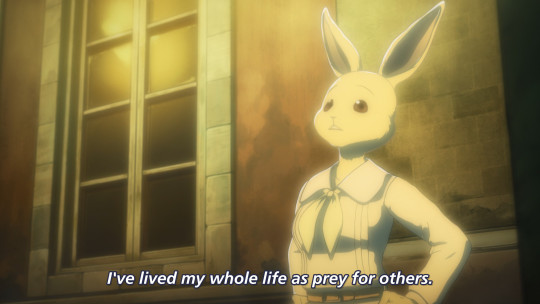
So here’s the CG anime that everyone for some reason decided way in advance would be the best show of the season, more or less by default. I was very skeptical of this for a multitude of reasons. First of all, that is a bad name for a show and you can’t convince me otherwise. It’s actually even worse because you’re supposed to write it in all caps, but I refuse. Second, it has a terribly on the nose conceit in which all sorts of animals live together in a high school setting and it’s all metaphorical ‘n shit. The main character is a wolf but get this, he’s actually all sensitive and quiet! Yeah, this is definitely rated D for Deep. And finally it’s by Orange, the CG studio that got an inordinate amount of acclaim for making Houseki no Kuni, the show that everyone thinks looks great and finally made CG anime worthwhile (actual real fact: HnK does not look great most of the time and CG anime was worthwhile well before it).
But enough about my preconceptions since Beastars is... pretty good, actually. If you ignore the setting, which is indeed terribly on the nose. And there’s not much else to say about the story so far besides it. However, it looks significantly better than Houseki no Kuni because it actually has really good character animation throughout instead of a one-minute action scene with flashy spinny camera tricks every other episode. The directing’s strong too, even if the show conspicuously mainly consists of obvious manga panels. I’m still not too hot on the animal stuff but the general writing seems to be sufficiently competent it would work simply on a character level. So I don’t love it, but it seems solid enough to see if it goes somewhere with its “Zootopia but also Beverly Hills 90210 but also they eat each other sometimes″ plot.
Rifle is Beautiful

Remember the whole “anime about some assorted anime girls joining a club doing an oddly specific activity” thing? This is another one of those, and now it’s about air rifle sports shooting. Except it’s not about air rifle sports shooting because that’s apparently way too violent, so they use rifles that look like exactly like air rifles but are actually based on lasers or really bright flashlights (they can’t keep their bullshit straight between scenes, sorry) instead. I just don’t think “girls doing activities” anime should blatantly misrepresent their subject matter like that, you know? With the possible exception of idol anime that is, ain’t nobody who wants to hear about that shit. Apart from that it’s nothing special, so if you are really into air rifles and wish to watch an anime that’s not about those, knock yourself out. It goes through a whole “club needs 5 members” arc in the first half of the first episode, so I really can’t say where it goes next. Nowhere much, I would guess.
Oh right, there’s one more thing: They frequently render the bodies in CG and the heads in traditional drawings, and they do it every time when they’d actually have to draw a rifle otherwise. It’s a weird effect that I think I haven’t seen anywhere else before, and it’s not great but also not terrible. And it’s the most interesting thing about the entire show.
Kabukicho Sherlock
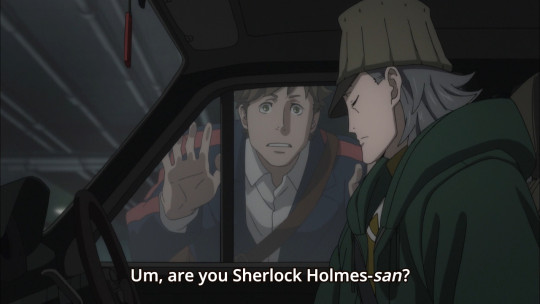
“Let’s take a bunch of public domain characters and put them into a hip modern setting” seems to be its own genre at the moment, and not only because the BBC did that with S. Holmes, Esq. already. Obviously this show is influenced by that (besides other public domain namedroppers like Bungou Stray Dogs), mostly in Watson and his relationship with Sherlock, but Sherlock-san is rather different here; he’s neither the classic Victorian bohemian nor the abrasive sociopath of the BBC version, and tends more towards a bumbling 90s pop culture version of autism and/or general wackiness here. These two are surrounded by a bunch of campy transvestites for some reason, and I’m not quite sure whether I’m supposed to find this particular stereotype offensive or empowering this week, but it sure is annoying. And it has the same character designer as Joker Game, so if you like chiseled, angular anime men, you’re in for a treat here - even if they tend to wear a lot of makeup and dresses sometimes. I don’t know man, it seems sort of okay-ish for the most part but it’s neither as funny as they think, nor as weird as they think, nor is the murder of the week intriguing at all. Oh yeah, he’s hunting noted public domain character Jack the Ripper. Because of course he is.
Shin Chuuka Ichiban!
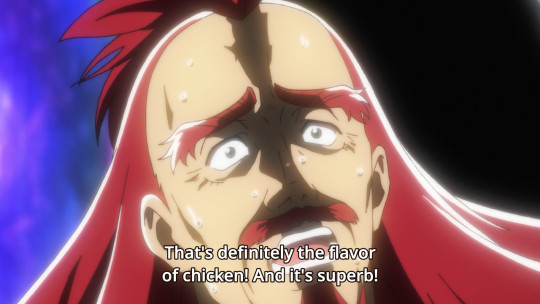
I am told this is the sequel to episode 19 of a 52-episode anime TV show from 1997. Okay. I am also told to not dare watch this without the important setup therein, which makes me think I should pay less attention to what I’m told because understanding Shin Chuuka Ichiban and its backstory is not hard at all. Kid is superawesome cooking champion in ancient China and goes around clowning on lesser cooks, got it. It’s not a complicated setup and it’s not a complicated genre either: This seems to be mostly about sick shounen cooking duels. Besides the setting, the main difference between this and Shokugeki no Soma seems to be that SnS goes for ridiculous and Chuuka Ichiban goes for epic - which is to say that it fancies itself emotional as well. Apart from that it’s what you’d expect from a cooking shounen, big moves, big reactions, huge twists and so on. One notable thing is that this show looks really, really nice. Production I.G seems to be establishing a sideline in taking stuff from the 90s and updating it with smoother animation and shinier lighting, while keeping the overall look intact; They did it for Mahoujin Guru Guru, and this looks much the same. Still, I’m just fundamentally not really interested in what appears to be a very straightforward cooking shounen from the 90s.
Assassins Pride
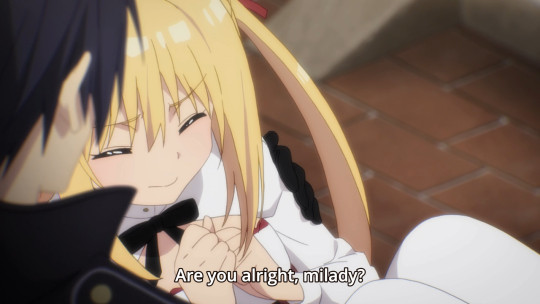
Straight from the Department of Chuuni, we have this light novel masterpiece about a cool as fuck teenage assassin who teleports behind u and nothin personells fools all day. He then meets a princess he’s supposed to off but just kinda decides not to, probably because she seems to be smitten by his m’lady act. Now he has to use his sick skillz to keep them both alive. It’s awful and terrible and no good and also kind of adorable. This truly is the most 13 AND A HALF MOM years old anime in a while, and it’s not even isekai! The writing’s just so amateurish and corny you can’t help but smile when princesses exposit their backstory for no reason while being accosted by pumpkin monsters (without knowing that Awessassin McCooldude happens to be listening in, which is certainly convenient). Or when the episode ends with the man just reading the synopsis of the show out again, in case you were too fascinated by this plot to pay attention to what it’s about. Yeah I’m not going to watch this in a thousand years, but it sure made me chuckle. Your mileage may vary.
Mugen no Juunin - Immortal
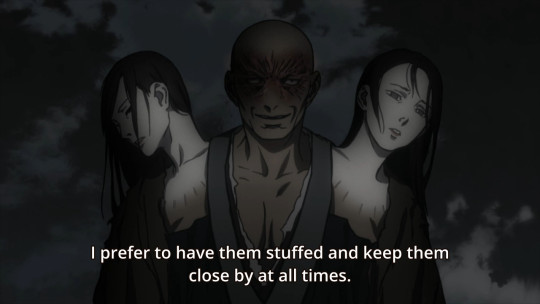
Speaking of 𝔱𝔥𝔞𝔱 𝔫𝔦𝔫𝔢𝔱𝔦𝔢𝔰 𝔢𝔡𝔤𝔢, another anime adaptation of Blade of the Immortal appeared! You know, the manga for the cultured and historically minded guro fan. The first episode of Blade of the Immortal runs with this and is an arthouse production that someone most definitely directed the shit out of. I don’t think I’ve seen this much directing since, well, Sarazanmai, but “Ikuhara amounts of directing” is pretty much the idea here. And most of the time it even works! The quickly edited, disorienting style gives episode 1 a feeling closer to horror than to a cool swordmen action show, and that really brings out the best in the material, which is grotesque splatter bordering on the comical - It’s somehow a better Junji Ito anime than the actual Junji Ito anime. I think it tries too hard in a few places, but at least it does try.
But then I watched the second episode and that one’s a fairly conventional splatter-comedy swordin’ anime. I am not at all pleased with this development. The third episode was better again and seemed to split the difference between 1 and 2, even if it mostly uses the tricky editing to save on effort in the action – I would much prefer actually readable fights and the wacky mannerisms in the more psychological stuff, thank you very much. Based on episode 1 I thought we might have something special here, but as of episode 3 I’d already merely call it pretty decent. I guess I’ll still stick with it but man, that’s a real bummer.
No Guns Life
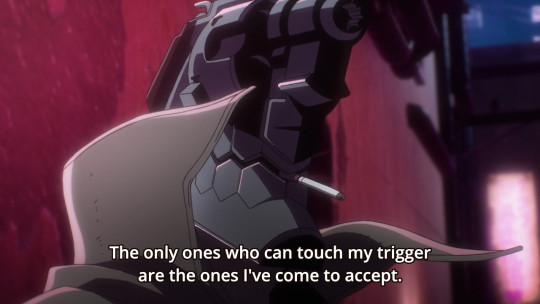
No Guns Life is a neo-noir thriller about a guy who has a gun for a head. That’s fuckin rad and exactly the kind of silliness I am totally down for. He also has a gun for a hand, and there’s also some battle nun’s who carry revolvers with two cylinders, so in short I think the title is false advertising. This sounds very wacky (and it is), but it also takes its noir very seriously, down to details more wannabe neo-noirs tend to neglect (like being set right after a big war). The look and feel is pretty excellent, with sharp design and high-contrast artwork, and the music goes all in on the moody saxophone as you’d expect. And there’s some really adorable “look mom, I’m writing” stuff about how Man With Gun For A Head really “needs someone to pull his trigger” and so on (which is, as the astute reader might remember, at the back of his head). It feels like a throwback but then I can’t really think of many 80s/90s shows like this, so it’s actually more like the sort of faux-retro idea Trigger/Imaishi would come up with on a lark. Trigger/Imaishi would, of course, make a far worse anime out of it, so it’s all good. Well, it has some pacing problems and as always it’s a fine line between amusingly camp and not so amusingly camp anymore, but No Guns Life seems to have enough real qualities that it can probably stand on its own even when its conceptual gimmick eventually doesn’t suffice anymore. I give it a two gun’s up.
Hoshiai no Sora / Stars Align
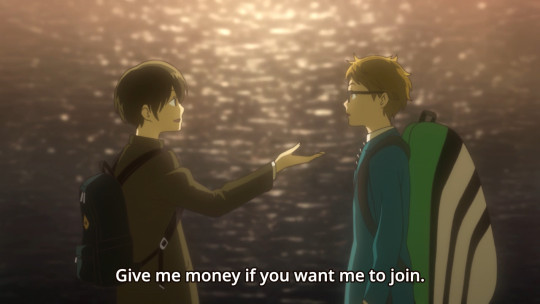
And finally, here’s an anime about middle schooler softboys playing a tennis just as soft as themselves, while being henpecked by the elites on the girl’s team. This is not an “actual” sports anime though: for starters, it’s not based on some shounen manga and is an anime original with quite some staff pedigree instead. It’s also more of a character drama that already goes to some surprisingly real places by the end of episode 1, reminiscent of the recent and quite good Run with the Wind. Furthermore, it looks delicious, with minimalist but distinctive and varied character designs and animation that’s both extremely detailed for a TV anime and also not trying to shove that fact into your face with flashy stunt cuts. In short, this show seems very simple at first glance but every aspect of it just oozes quality. If nothing else, it’s already worth watching just for the excellent ending sequence where the characters show off their “best” dance moves and the chunky student council president dunks on everyone. This one caught me by surprise and it’s an easy pick for most promising show of the season.
#anime#impressions#Beastars#Rifle is Beautiful#Kabukicho Sherlock#Shin Chuuka Ichiban!#Assassins Pride#Mugen no Juunin - Immortal#No Guns Life#Hoshiai no Sora#stars align
63 notes
·
View notes
Text
What I Had To Do - TLoUII SPOILERS
I started feeling compelled to write a deep reflection on The Last of Us Part II when it became clear I was going to be playing as Abby for quite some time. Like everyone else, I imagine, I had made up my mind about Abby almost immediately. She would die, and I would be the one to do it. I didn’t want to play as Abby, I wanted to not move the controller and just have her die. But the game makes the choices here.
Of course, knowing Naughty Dog and expecting the level of quality I did from this game, there was certainly a reason we were slated to spend so much time with her. While I ultimately came to respect this choice, it was plain to see that the game was going to attempt to change our minds about Abby, to show us how she came to be the person she is and how she was driven to do the things she had done. For this reason, I was not engaged in Abby’s story. Because, like I said, I’d already made up my mind.
The brilliantly-handled revelation of her father being the surgeon the player is forced to kill in the first game was enough to fully humanize this woman who, in the space after she kills Joel up until she is hoisted in the Seraphite noose is surely the most viciously despised character on Playstation. Even though I kept the difficulty low in order to breeze through her portion of the story, I admittedly did eat my words: “If they can change my mind about Abby, I’ll be shocked.” My mind was changed just about as much as Abby’s heart changed throughout her ~10 hours of game time. She ends up doing almost exactly what Joel does for Ellie for a very similar reason, although Lev’s brain can’t save the world.
When I found Abby at the Pillars, I had already decided that if the game were to give me the option to press Square to kill Abby or circle to let her live, I’d smash the circle button. When Ellie says “I can’t let you leave,” I thought to myself, “yes, let’s actually do let her leave, but we probably should fuck her up a little bit, right?” Fuck her up we did, but of course the game isn’t base enough to trivialize the story it’s told over 20+ hours by letting you funnel out all your rage with a button press, completely destroying Ellie’s and Lev’s lives with a single click.
So ultimately, Abby’s segment shows us a lot about the world we’re living in inside this game, and the metaphor of warring clans with their own agendas and perspectives very directly reflects the distilled personal motivations behind Abby’s and Ellie’s actions. I said a hundred times that Abby’s section was too long, and I think I’d drastically shorten the first act. I don’t think we needed to stroll through the base and see kids taking classes in an attempt to humanize and raise the stakes for her. When we’re forced to play as her, we are not interested in what is happening. You could start with information about Owen and the coming attack on the Island. A lot of Abby’s section felt like Druckmann knowing that we need more hours for $60. But this may have been because until Lev’s mother dies in her cabin, I still wanted to watch her die.
This is where it all changed for me, except for the feeling that her segment was still too long. One thing this segment does perfectly and to hopefully great and continued effect, is to show us--more than the game already has--that LGBTQI+ stories are now a part of our human experience, and these people will be in the stories we tell. And it won’t be a fucking big deal. “Do you want me to ask about it?” “No.”
I was able to stay almost entirely blind to the promotional materials for Part II. When I started the game at 11pm CST, I knew only that there was a guitar, there was a fight in a shopping area, and there was a real bad person cutting a hanging guy’s stomach open. I was also able to avoid anyone’s conjecture about the game, but in seeking the opinions of others after I’d completed it, I’ve discovered the bizarre criticisms about the narrative. Namely, being forced to play as Abby for so long and having “social issues” shoved in their face when they’re “just trying to play the game.” I had a problem with the Abby segment even after I began to see its purpose, but eventually it cracked me open in the way it intended. In making me do the things she’d done, I was of course forced to fully realize her perspective from the moment we’re put over her shoulder instead. But the latter issue is what bothers me to no end, and it’s upsetting that we’re still here as gamers.
If someone has a problem with Ellie’s sexuality or coming of age, Dina’s sexuality, Lev’s gender identity, or the fact that all our main characters are women, then the only hope I have for that player is that they might see themselves in Seth. Seth is the physically oldest character we see in the game, and he is the only character who has any problem with what he’s seeing. He’s alone in his bigotry and he is weak. He will die very soon and he will do nothing meaningful before then, aside from being forced to make free steak sandwiches for those he has hurt by those who are in power and do not take his side. If this hypothetical--although very real--player fails to make this revelation and turn this corner, if that person still disapproves of the story being told, my question to them would be: “did you accidentally buy this when you meant to download Call of Duty: Warzone?” If you’re not playing the game for the story, you should just play a game where you’re always shooting things. If you are playing the game for the story and you have a problem with the story, also fuck off to Call of Duty. I use Call of Duty here because it’s mainstream and not objectionable and you are holding the trigger through most of the game where the story doesn’t matter if you don’t want it to, not because I have a problem with its playerbase or the games themselves.
The dissent I still cling to is that it’s difficult to ratchet intensity upward and keep motivation high when you know the character has to survive because you’ve seen a future piece of the story--especially when you don’t want them to survive. This was most sharply upsetting when I was still playing as Abby after she shoots Jesse and Tommy in their heads. I felt like tossing the controller and quitting. The only reason I can think of for this choice is that the trope of unwinnable fights in games exposes the guts therein. For me, though, this exposed them even more. I would rather have tried very hard to kill Abby and then have her overpower me with those cannon arms and watch the devastating Dina scene play out. It’s what I wanted just then, and was undoubtedly what Ellie wanted. This would have aligned me more with her, the character who I would still side with instantly and unquestionably. It was so strange to fight Ellie’s AI, particularly because the computer does not play her like I do, and for the only portion in the entire game, she was not human. I understand what this rigid perspective attempts to illustrate, but the choice still puzzles me greatly.
While I am still able to see why the game did it and why it was necessary, there was no way I was ever going to care about the Jackson Crew. This made playing with Manny and Mel very frustrating. Owen’s meta-perspective philosophizing about how none of the clans are actually any different from each other was interesting, but it was not touched on for very long, and now seems to only have been there to benefit Abby’s journey toward her own perspective-altering events. I see this as the only other true failing of the game, although I don’t have any idea how it could’ve been done differently. Aside from being shorter.
The reason everyone hates playing as Abby is because very few narratives have ever fully explored the other side of a conflict, and for us to be forced to see that, to play as The Bad Guy for so long, is something we’re absolutely going to hate for a long time. It does, or it should if you’re paying attention, eventually do exactly what it’s supposed to do. When Abby becomes human, we can then say that we’ve experienced the story up to that point. We are almost never shown this, much less forced to do it.
Another thing I’m stuck on but can’t suss out is the theme of pregnancy and innocence. Of course, an unborn baby is completely innocent even in an overgrown hellscape. Where this is most effectively employed is when the knife is at Dina’s throat. “Good.” Maybe the most terrifying line in the whole pair of games. It shows us the depth of hatred these women have fallen to, and how, like the player controlling Joel or Ellie or Abby in parts I and II, when we have to survive, it doesn’t matter what’s going on in anyone else’s life. If we feel someone has wronged us, we take everything from them and don’t consider the consequences. This game does show us our own actions very plainly, and the ultimate consequence could not have been more beautifully shown than in the final chronological scene in Part II. In following her own anger--combined with Tommy’s--she has damaged her connection to the very reason she followed it. She cannot play the song she shared with Joel without wounds appearing in the music itself.
Ultimately, the story told here is about violence. Why, how, and when it is employed, the unexpected casualties thereof, and how it changes the world for everyone connected to it. Love, hate, survival, revenge, and so many more. Joel protecting Ellie ended a lot of lives--starting as duty and perverting into misguided redemption and love. Abby avenging her father ended a lot of lives--starting as revenge and ending as duty and love. The cyclical implication is very clear as we come to blows between the two rowboats, although it is--like many other gigantic story moments--masterfully left un-hinted-at. If Ellie were to have held Abby under the water for a minute more and Lev were to survive somehow, we’d have ourselves a Part III for almost the same reason which started us down the troubling path of Part II. Can you imagine Ellie looking into the boat at a broken and unconscious Lev? Would she have felt something similar to looking over the bars of JJ’s crib?
What a lot of games don’t bother to explore is what violence takes away from those who employ it, no matter the reason for their doing so. When Ellie walks away from the farmhouse where her family used to live, leaving the last object connecting her to Joel there at the window, I was devastated, as I’m sure we all were and as I’m sure the storytellers intended. Through the deeply troubled feeling Naughty Dog left me with, I was searching for meaning, like Ellie was after seeing those giraffes: “After all we’ve been through. Everything that I’ve done. It can’t be for nothing.” What was it for? It seemed like it was going to be difficult to determine when the credits started to roll, but when it appeared to me, I was embarrassed it had taken me so long to figure out. Everyone was led to their devastating conclusion by the same driving force: love.
There’s also been a fair bit of talk about how bleak the outcome is, and how hopeless everything seems. This observation comes down to how deeply we’re hit by Abby’s boat disappearing into the fog as we sit entirely alone, physically and emotionally less than we’ve been so far, and how the ending and outlook of the whole game isn’t really what we want right now because our world doesn’t need a lot of help in the bleak category. Of course we want everything to work out, and we are so used to video games giving us what we want. Tragedy doesn’t cater to the wants of the audience, and the weight of this tragedy is gargantuan. What a knee jerk dismissal of the story would rob you of is the incredible contrast. I finished the game eight days ago and I’ve probably watched the dance scene at least once per day since. How gorgeous. “Oh, Ellie…” says Dina. To feel this moment fully, knowing its the beginning of a beautiful thing that can’t last, is a gift rarely given to any audience or player. It does so much so deeply in 3.5 minutes. That scene in itself shows us that this isn’t what we’re used to, and the bit of Joel and Ellie’s interaction we get in that scene also demonstrates that the things we care most about are not okay right now. We were Joel more than Ellie in the first game and we protected her. We saved her. We want to continue to protect her.
But the decisions Joel made in the hospital guaranteed things would never be okay. What is it that these folks want from the ending? “You killed Abby! Congratulations! Ellie went on to found Joel Miller Memorial Research Center, where a cure was eventually reverse-engineered from a culture of bacteria extracted from Ellie’s intestine. Dina eventually forgave Ellie, and invited her to live with her and JJ inside the walls of Jackson where they dance, free from hatred and despair, every Thursday night.”
It’s hyperbolic, sure, but what a fucking waste that would be. What we have instead is a seemingly insurmountable sorrow which wraps around a glowing core of warmth and beauty which we’ve seen firsthand throughout both games, begging us to discuss and reflect and analyze and feel. Is the ending really entirely hopeless if Ellie puts down and leaves behind the guitar which attached her to Joel? I don’t know if she’s wearing or still has the watch, I’d have to see the cutscenes again. But she’s walking away from it, finally. What could she be walking toward?
Finally, there is one piece of storytelling after the credits, not a cutscene or a piece of text. The iconic title screen rowboat which we assume Ellie rides away in is replaced with its twin, dragged up onto the shore near Abby & Lev’s beached fishing boat. I’m having trouble putting what I believe this means into words that don’t sound too disgustingly sunny, but if Abby and Ellie, these two veritable destroyers are now free from the searing chains of revenge, and we’ve seen their allegiances shift and their hearts fundamentally changed, imagining the good they’re capable of isn’t too terribly difficult a task. That’s disgustingly sunny to even type out, but I believe it’s supported. It’s very clear that at this point, both parties deserve and have earned peace, inside and out.
1 note
·
View note